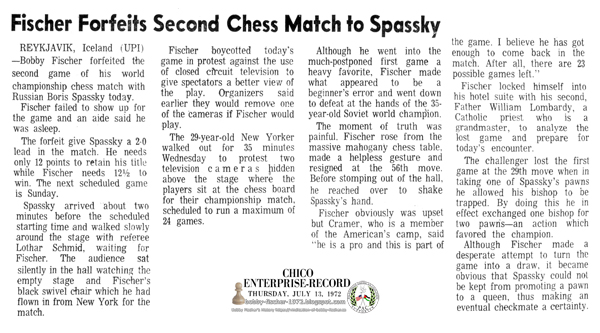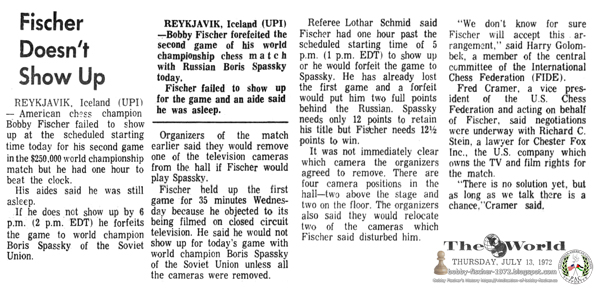New York Times, New York, New York, Thursday, July 13, 1972 - Page 31
Schmid Makes No Moves, But Rules Chess Match
Reykjavik, Iceland, July 12—Last Thursday, as soon as Boris Spassky and Bobby Fischer shook hands, Dr. Max Euwe, president of the International Chess Federation, turned to Lothar Schmid. “Now,” he said, “it is all yours.”
Dr. Euwe, who had suffered through harrowing negotiations, postponements and protests, who had mediated, cajoled and apologized, was bowing out. All responsibilities for the world championship chess match now devolved on Schmid, the referee.
It will be up to Schmid to see that things run smoothly. But he almost missed the opening game last night. On Saturday he received word that his 10-year-old son had been injured in a bicycle accident.
Schmid dropped everything and flew to his home in Bamberg, Germany. At that time, he did not think he would be able to officiate at the opening of the chess match, and that an assistant would have to fill in. But his son's injuries were not serious, and Schmid flew back just a few hours before Fischer and Spassky squared off.
The Man in Charge
As referee, Schmid is the ultimate arbiter; not even the International Chess Federation can step in any more. “I have complete responsibility for things that can happen on and off the stage,” he said the other day. He said this with a wry smile, knowing full well that with Fischer around ([who will not allow the Soviet machinations bully him into submission, in spite of their desperate antics to retain the crown]) the most unexpected things can happen off as well as on the stage—and today's half-hour walkout by the challenger is one such unsettling development.
A grandmaster since 1959, the 44-year-old Schmid knows the rules inside out. In most cases, a referee has little to do during a game, but emergencies can arise. There is the eternal problem of touch move, for instance. Sometimes, a player claims that his opponent has touched a piece and therefore must move it. The referee will have to settle the dispute.
Then, too, a player may claim a draw on repetition of moves, which happened in the match last year between Fischer and Tigran Petrosian, a former world champion. Schmid was the referee for that match, and he had to explain to Petrosian that Fischer's claim was indeed correct.
“Or,” says Schmid, “suppose the lights of a hall go out.” The referee immediately stops the clocks of both players. Then he can postpone the game or remove it to another hall.
Or there are silly things not in the rules. In the Buenos Aires match between Fischer and Petrosian, Fischer objected to Petrosian's habit of writing the most on his score sheet and moving. Most players move and then write. Petrosian was good-natured, and he agreed to move and write.
Schmid, a short, handsome and articulate man, with a youthful face and gray-streaked hair, speaks fluent English and seems versed on any subject that is brought up.
He was born in Dresden in 1928, but his family moved to Bamberg after World War II. Schmid became a lawyer, but his other love was chess, and he spent much time on it.
He played on student teams, representing West Germany in international tournaments. Then he became an international master, and finally a grandmaster.
In recent years, Schmid has played relatively little chess. He describes himself as an “amateur” who makes his living elsewhere. Schmid is head of the Karl May publishing house in Bamberg. He also owns what is reported to be the finest private chess library in existence. It numbers more than 10,000 volumes.
Several weeks ago, Fischer objected to Schmid as referee, but was overruled by the International Chess Federation. Fischer wanted an inactive player as referee, claiming that the Soviet Union dominated international chess to the point where all active players were biased in their favor. Schmid quietly pointed out that he was no longer very active as a player, and that he had played in the Soviet Union only once.
The easy-smiling Schmid can exercise a great deal of charm. One grandmaster here tells of the time he played the German some years back.
“I think I had the edge,” he said. “I was studying the position, then looked at Schmid. He gave me this great big smile of his and grabbed my hands. I agreed to the draw. It was the first and only time I have ever been charmed into a draw.”
New York Times, New York, New York, Thursday, July 13, 1972 - Page 31
Amusement and Then Sadness Reign at Marshall Chess Club by Martin Arnold
The blunder he made in the first game doomed Bobby Fischer so magnificently that the members and visiting kibitzers at the Marshall Chess Club actually laughed when he made it Tuesday.
But by yesterday, when they were again filling into the old brownstone at 23 West 10th Street, the laughter had turned to a certain sadness that the great Bobby — the mighty Casey — had impetuously (could there be any other explanation?) struck out.
For there at the big chessboard, confirming all too sharply what they themselves had proved time and again at their own chessboards at home, through the long night, was 86-year-old Dr. Edward Lasker, a wizened international master (grandmaster by today's rating system) in a seersucker suit. He was saying that “no matter how you count the squares, there's no way Spassky can lose if he doesn't make a mistake.”
Puzzling It Out
Great blunders are made, as Victor Hugo said, “like large ropes, of a multitude of fibers,” so yesterday part of being a Marshall Chess Club member was unwinding the fibers. George Kane, the youngish club champion, who plays chess for a living as well as for a hobby, said that Fischer “makes few oversights, but he wanted to win so badly, psychologically he overlooked something.”
The club, like a British regimental mess, is dark and wooden and there were no women there. But rather than drinking tables, it has chess tables.
There are trophies instead of guns, and in place of the musket that felled the chief of the Fuzzy-Wuzzies, there is, in a position of honor, under glass, Paul Morphy's sn*** box.
Morphy, the American chess genius of the 19th century, is considered by most experts to be the greatest American player ever, except perhaps for Fischer, and his sn*** box is the equivalent of Lord Kitchener's mustache cup.
The club was not crowded yesterday because most of its members had to work, but two members did take their vacations to coincide with the opening of the match and another man, the president of a machine manufacturing company, wandered in off the street so he could in some way be part of the chess adventure taking place in Iceland.
“I played hookey yesterday also,” said Harry L. Bondy.
‘Most Precise Player’
One club member who took his vacation to be at the club was David Joseph, a 48-year-old certified public accountant. He was the only member who refused to concede, before Fischer resigned, that the American grandmaster had made a mistake. “I thought it was a calculated move by the most precise player in the world, who knew exactly what he was doing.”
“The odds of Fischer ever getting a draw are 2 to 1 against,” said Dr. Lasker, moving magnetized chess pieces on the metal board used to follow the match.
The board hung like a picture, flat against the wall, and the black king that was Fischer's kept turning over because the board was an old one and was losing its magnetic qualities.
“That's a premonition,” said Howard Ant, a practicing lawyer who is the club's tournament director and who also took his vacation to be on hand. “Whenever a game is lost we turn over the loser's king,” he remarked.
“He [Fischer] had an easy draw before that 29th move,” — when Fischer took a pawn that could not safely be taken — said Mr. Ant. An hour before the end, trying to unravel the fibers, he said. “Now it's an uphill fight for a draw.”
Around the chess tables the members lounged like so many off-duty soldiers, moving pieces, trying in some way to conceptualize what was going on in Fischer's mind an ocean away.
Of course, they couldn't. But Steve Brandwein, a member, kept returning to that fatal 29th move. “He played a move that no other grandmaster in the world would have made,” he said, adding:
“I guess he decided he didn't want a draw—that must be it.”
New York Times, New York, New York, Thursday, July 13, 1972 - Page 31
Fischer Walks Out, Comes Back, Loses by Harold C. Schonberg
Reykjavik, Iceland, July 12 — Bobby Fischer lost the first game of his world championship chess match with Boris Spassky tonight after staging a 35-minute walkout.
Later, Fischer was reported to have said that he might not play tomorrow's scheduled second game.
The first game, adjourned after 40 moves, resumed at 5 P.M. An hour and five minutes later, in a hopeless position at the 56th move, the American challenger stood up and offered his hand. Spassky, the champion, took it, and the game became history.
One Fischer admirer said sorrowfully: “A beginner's blunder cost him the game.”
Fischer's walkout could lead to another of the blowups that have been a bewildering part of this match and the long, harrowing negotiations that preceded it. It also appeared that once again the rules had been bent in favor of the American grandmaster. Lothar Schmid, the referee, called a meeting about Fischer's walkout after the 43rd move and the objection that led to it, and he said he might have to hand down a ruling at tomorrow's game if Fischer persisted in his attitude.
Fischer objected to a television crew working from an aperture at the side of the stage. He said that the movements of one of the cameramen distracted him, and he stalked off the stage. Fischer's clock was on during his absence and when he finally returned to the chess board, he was left with 25 minutes to make 16 moves.
Officials of the Icelandic Chess Federation and members of the Fischer delegation rushed backstage when Fischer made his objection, and pressure was brought on the cameramen to leave. It was reported that the camera was dismantled.
Schmid later said that he had had no part in the decision to eject the cameraman. But, Schmid said, if Fischer persisted in his objections, there would be trouble. Schmid specifically cited two rules in the contract governing the match.
Rule 17 involved the sportsmanship of the players, and specifies that it if forbidden to disturb an opponent on the move. In Schmid's opinion, Spassky was disturbed. ([But that Fischer reports being disturbed by disruptive camera crews… “NYET PROBLEMA!” say the U.S.S.R.])
Rule 21 states that television coverage, as part of the agreement among the parties to the match, is permitted.
Fischer, according to Schmid, claimed that since he personally had not signed any agreement, the rules did not apply to him. But Schmid — who was trained as a lawyer — said that since Fischer had started the match without making any objection, he legally was considered to have agreed to the rules.
([Says Fischer to Johnny Carson in November 1972: “I was more disappointed than anybody that this thing wasn't televised because, you know, there was a lot of publicity and a lot of money involved and I wanted the people to see me in action. Let's face it. But they had these characters there, who instead of having, some kind of video tape film that didn't make any noise, just, nobody around to operate them, just sort of stationless and they just had guys there with film cameras that were worrying, and they were all around me. Making a racket. A nuisance. Too much noise, and visually you could see them moving around.” See the “Bobby Fischer Chess Hall of Shame” Fischer 1 Camera 0. The bigger question is, who led Fischer to believe, Soviet controlled Icelandic organizers would provide stationary, unmanned, automatic video cameras? Was Fischer misled by the Soviet Union, Iceland and Chester Fox so that Fischer didn't make said objections prior to his arrival in Iceland? Actually, Fischer DID make objections before the opening July 11th match began … … The Times-News Twin Falls, Idaho Tuesday, July 10-11, 1972 “The $250,000 world championship chess match between American Bobby Fischer and Russia's Boris Spassky was still go today, but Fischer made a last minute demand to stop televising the first of the 24-game series. “There will be no TV filming tonight, but we hope some other arrangements can be made so they can film later during the match,” said Fred Cramer, vice president of the U.S. Chess Federation. Fischer said the television cameras, hidden behind cloth-covered scaffolding above the stage where the players will sit, would distract him.”]) So this was not “news” to Schmid. The Soviet and Icelandic organizers very much desired the distractions created by camera crews to disrupt Fischer's concentration… and ultimately, knowing Fischer would win the championship, to suppress coverage of the humiliating defeat of Soviet arrogance.])
Later, after the meeting called by Schmid, aides to Fischer—who was off bowling while the meeting was going on—said he had threatened to boycott tomorrow's game unless all cameras were forbidden in the auditorium.
Fischer, his spokesman said, objected not only to the television equipment, but also to the popping of flash bulbs on cameras in the audience.
Opinion Changes Overnight
Before the adjournment last night, Fischer had given up a bishop for two pawns. At the time, it was not known whether he had blundered on his 29th move, or whether he had a continuation so deep that nobody could see it. ([HE WAS DISTRACTED. JUST AS HE SAID HE WAS. SOVIET MAKE UNSCRUPULOUS ILLEGAL MOVES, OFF THE CHESSBOARD BECAUSE THEY KNEW THEY WOULD NOT WIN, ON THE BOARD.])
A night of analysis convinced the experts that Fischer's move was indeed one of the strangest lapses in grandmaster history.”
Fischer's magic is such that even some grandmasters thought, directly after adjourned position, that he might be able to draw, but that was yesterday. This morning at breakfast, Spassky was smiling and appeared confident and relaxed. Fischer was not to be seen at all.
Nikolai Krogius, the Soviet grandmaster who is Spassky's psychologist, said before play was resumed that Fischer was lost. So did an American grandmaster, Robert Byrne.
Chess enthusiasts who had spent the night testing every possible combination agreed, and so it turned out.
Theories are being advanced about Fischer's incredible blunder. One, taken seriously by chess experts, involves the temperament of the two players.
Fischer, so goes the thinking, was so eager to win the first game that Spassky purposely played a dull line, trading off pieces and waiting until the bored and irritated American would do something rash. In other words, Fischer was lured out of a drawn position into a loss.
This theory may sound far-fetched, but such things have been known to happen. Bent Larsen, a great Danish player, for example, often throws away a draw in his eagerness to win. Such impulsiveness is not normal to Fischer's cool, precise style, but this first game was something special, and Fischer gambled and lost.
Many Theories Advanced
Another theory holds that Fischer has been so preoccupied with the business and controversial aspects of the match that he has not prepared himself as thoroughly as he might have done.
And still another explanation is not really a theory. It is, simply, that the great Bobby Fischer made a mistake. ([Likely because he was distracted by noisy camera crewmen.])
“Fischer did not think enough about the move,” said one American grandmaster. “He rushed into it and he goofed.”
A goodsized audience saw the hour-long playoff today, and the crowd was enthusiastic and well-behaved as it had been at the opening. Fans in the auditorium were scrupulous about not making noise.
Many spectators had high-powered binoculars with them. It was reported by one binocular-owner, who had his glasses on the stage yesterday when Fischer made the 29th move, that Spassky's face took on a look of sheer incredulity.
Normally, Spassky is a study in impassivity during a game. So, for that matter, is Fischer. Both are professionals who, like professional prize fighters are trained never to show emotion.
Aside from Fischer's walkout, neither player has done anything unusual during the actual course of play. Neither is a smoker, and neither has ordered food or beverage to be brought to the stage.
For the most part, they sit motionless and stare at the board. Occasionally, one or the other may get up to stretch his legs, disappearing behind the stage curtains into an area reserved for the players. Seldom are they away more than five minutes at a time.
Spassky Strolls Stage
While Fischer was having his television troubles today, Spassky disappeared for a while, and he also strolled around the stage. Instead of the rather formal business suit with vest he wore yesterday, Spassky was wearing a part of light-colored slacks, a white shirt and tie and a sports jacket. Fischer, too, wore a tie and jacket.
Historians around here are busily citing precedents in previous championship play. They point out at least three examples of players in a world championship match losing the first game and going on to win.
Spassky lost the first game to Tigran Petrosian in 1969, Petrosian lost to Mikhail Botvinnik in 1963, and Dr. Max Euwe lost to Alexander Alekhine in 1935.
The match has quite literally just begun. Spassky has 1 point; he needs 11 more to retain his title. Fischer needs 12½ points to wrest the title from the 35-year-old Soviet star.
The chess historians gathered here are asking: Has Spassky the Indian sign on Fischer? The 29-year-old American has yet to win a game from Spassky and the score is now four victories and two draws for Spassky.
Fischer has the white pieces tomorrow night, however, and this time—assuming he players—he will be on the attack, presumably thirsting for blood.
The Escanaba Daily Press, Escanaba, Michigan, Thursday, July 13, 1972 - Page 1
Fischer Wants Cameras Expelled
Caption: CHESS MATCH — Boris Spassky, left, Bobby Fischer and chess referee Lothar Schmid are at the end of Tuesday's session in the world championship match. Spassky won the first game of the match and the second game is scheduled to begin today. (AP Wirephoto)
Reykjavik, Iceland (AP) — Bobby Fischer today was reported threatening to break off his world championship chess match with Boris Spassky unless all movie cameras are removed from the playing hall.
“It's quite serious. He may not play at all,” said a member of Fischer's entourage who asked not to be identified.
Fischer was scheduled to meet the world champion from the Soviet Union later today — at 1 p.m. EDT—for the second game of their 24-game match. The American challenger lost the first game Wednesday night.
Fischer staged a 30-minute walkout shortly after the play began Wednesday, complaining that a movie camera 150 feet away was making him nervous. The camera was hardly visible in the dimness outside the lighted player's circle, and it could not be heard by Fischer, but aides said the knowledge of its presence unnerved him.
Chief referee Lothar Schmid of West Germany, who makes the decisions on all contested points in connection with the match, told Fischer during his walkout there was nothing he could do about the camera.
Film and television rights for the match have been sold to an American promoter, and Fischer and Spassky are to get a share of the proceeds, estimated at a minimum of $27,500 each.
Contacted at his hotel, Schmid said: “There will be a match tonight. If Fischer doesn't appear, he will take the consequences.”
Richard Stein, a lawyer for the promoter who bought the TV and film rights, Chester Fox, said he was up all night with Fischer's second, the Rev. William Lombardy, and Fred Cramer of the U.S. Chess Federation.
Stein said that at one point Fischer walked in on the meeting, listened for a few minutes and then in a few sentences indicated he was adamant about expelling the cameras. Then he went to bed.
In agreement with Lombardy and Cramer, Stein wrote Fischer a letter at 5 o'clock this morning appealing to the challenger to accept the presence of the cameras and go on playing.
Schmid said he was prepared to invoke two rules of the match against Fischer.
Rule 17 prohibits in the name of “the highest principles of sportsmanship” that either player “distract or annoy his opponent.”
Rule 21 allows the taking of pictures during the match by official photographers as long as the cameras are “neither visible nor audible.”
([Note the deliberate obfuscation. It was not the camera, but was the humans and their errors operating the cameras, as explained by Robert J. Fischer in November 1972. Why the cover up, Soviet Union, FIDE and Icelandic Chess Fed? Deliberate noise and commotion plotted, to disrupt Fischer's concentration.])
Fischer 1, Camera 0: FACT CHECK: November 08, 1972 Johnny Carson Interviews Bobby Fischer (8:43/18:30)
CARSON: Now what about the cameras over there Bob? Now you hear about all this about you'd agreed they could film this, and then you kept changing the camera man was Vladivostok someplace, or …
[laughter]
What was the real story?
FISCHER: I was more disappointed than anybody that this thing wasn't televised because, you know, there was a lot of publicity and a lot of money involved and I wanted the people to see me in action. Let's face it. But they had these characters there, who instead of having, some kind of video tape film that didn't make any noise, just, nobody around to operate them, just sort of stationless and they just had guys there with film cameras that were worrying, and they were all around me. Making a racket. A nuisance.
CARSON: Too much noise.
FISCHER: Too much noise, and visually you could see them moving around.
The Atlanta Constitution Atlanta, Georgia Thursday, July 13, 1972 - Page 6
Georgian Lost to Fischer by Bob Geurink
A Milledgeville textile executive who looks at his opponents “like a snake” was beaten by U.S. champion Bobby Fischer in Argentina back in 1959.
That's from Richard Haas, president of the Southern Chess Association last year. He said Wednesday that Milledgeville's Ruben Shocron won the association's tourney last July 4 and said Shocron looked like this as he beat a field of 156 others:
About five-nine, 150 pounds, wiry build, dark complexion, dark hair with a little gray in it spilling just a bit over his collar. He played with his suit coat on, was polite, soft-spoken and quiet. His moves were quick and darting.
“He didn't get up and walk around and smoke or rumple his hair or do what so many other nervous players do,” Haas said. “He just sat there and looked at two things like a snake: the board and his opponent.”
He said Fischer played Shocron in Mar del Plata, Argentina, when Fischer was 18. Shocron was in his 30s. Shocron wasn't immediately available to discuss himself, but Haas was happy to fill in for the Dixie Champ.
Shocron came to the United States from Argentina about six years ago, Haas said, working in New York and North Carolina before going to Milledgeville about a year and half ago where he now is a textile executive. He hadn't played any regular chess in the U.S. till he got to Georgia. Why? “I guess he just hadn't the time,” Haas said.
Haas mentioned that Monday's Constitution was a little off in its running moves of the Fischer-Boris Spassky match. For buffs, here it is: Fischer's 40th move was 40. … P-B5, not P-B4 as shown in the paper.”
He said he thought Fischer would win if he shows the good form he has shown in the last year, and Spassky keeps doing as poorly as he has during that time. “But Spassky could rise to the occasion; after all, Russians have had the title since 1948 and they don't want to lose it.”
However, Haas quoted Soviet Russia's granddaddy, Nikolai Lenin, as saying: “Chess is too serious for a game, but too much of a game to be taken seriously.”
Anyway, chess is booming in Georgia. Right now, Haas said, there are 425 Georgians in the U.S. Chess Federation; back in 1964-65 there were only 24. There are about 75,000 Atlantans who know the moves.
And what's the average Georgia chess player like?
Like this, Haas said:
1. About 35 per cent of them are under 20. Some 95 per cent of those in the July tournament were under 45.
2. They're all types. “You can have a wealthy Northside doctor and 15-16 year old black kids from the ghetto.”
3. A higher IQ tends to make a better chess player, but not always; a Georgia Tech student with an IQ of at least 130 could be beaten by somebody with an IQ of 100.
4. Most good chess players have strong photographic memories.
5. They also have a “killer instinct” and a “willingness to messit up.”
Albany Democrat-Herald Albany, Oregon Thursday, July 13, 1972 - Page 1
Bobby's Boycott Results in Forfeit; Disqualification Looms for Yank
Reykjavik, Iceland (AP) — Bobby Fischer forfeited his chess game with world champion Boris Spassky of Russian on Thursday by failing to appear at the playing hall.
Fischer boycotted the game because he objected to the presence of movie cameras in the hall.
The forfeit gave Spassky, who beat Fischer on Wednesday, a 2-0 lead in the scheduled 24-game series. It was uncertain whether the match would survive.
Chief referee Lothar Schmid gave Fischer the hour provided by the rules to make his first move.
When the hour was up, Schmid examined the clock, walked to the front of the stage and said: “Ladies and gentlemen, Mr. Fischer did not appear in the playing hall. According to rule No. 5, if a player is more than one hour late, he loses the game by forfeit.”
Spassky was not on stage at the time. He later emerged from behind the beige curtains backstage, bowed to the crowd and left.
Robert Byrne, the No. 2 U.S. player, said: “You are watching the first two-game world championship in the history of chess.”
During the elapsed hour, there was a constant relay of telephone calls between the Sports Palace and Fischer's hotel.
The crowd's reaction was one of anger. A young American who used his savings to travel to Iceland for the match said something unprintable. ([He should blame the Soviets for selecting Iceland to bury the match, then, misled Fischer about the level of commotion that would be created by Chester Fox/Iceland/Soviet Union's camera operators who were placed there to distract Fischer and break his concentration]).
At what point Fischer would be disqualified from the championship series would have to be decided by the International Chess Federation—FIDE, Schmid said.
Spassky, who won the first game of the 24-game match, entered the near-empty Sports Palace on time and took his place behind the black pieces arrayed in battle order before him.
As the rules required, Schmid started Fischer's clock, since he was to have the first move with the white pieces. Spassky looked somewhat perplexed.
Richard Stein, the lawyer for promoter Chester Fox, said “we did everything we could” to appease Fischer. ([No you didn't. You were appeasing the Soviet Union who wanted a win by default, by using noisy and distractive camera operators. You could have used unmanned, automatic, stationery cameras, but refused, knowing you never had any intention to “appease” Fischer!])
The American chess champion objected to the presence of the cameras ([correction: the disruptive camera operators]), though he could neither see them nor hear them in the darkness of the 2,500-seat auditorium. ([Fischer firmly disagreed, as he reported seeing those camera-men moving all around in the auditorium. Why the deliberate attempt to confuse the readers. Fischer was directing his complaint at CAMERA MEN... not the cameras.])
“He said they bothered him because he knew they were there,” Fox reported ([and as Robert Fischer reported, he knew they were there because he could see them moving around in the auditorium. Rather unmistakable don't you think?])
Stein said Fix couldn't comply with Fischer's demand to remove the cameras.
“The whole financial structure of the match depends on it,” Stein asserted.
The phone call informing the organizers Fischer wasn't coming was made by Fred Cramer, an official of the U.S. Chess Federation who has access to Fischer. It was made to Gudmundur Thorarinsson, president of the Icelandic Chess Federation.
Fischer staged a 30-minute walkout shortly after the play began Wednesday, complaining that a movie camera 150 feet away was making him nervous. ([Again, why do you seek to confuse readers, Mr. Yellow Journalist? Fischer did not report the “camera” was the problem, but that humans were distracting him, he reported “they just had guys there with film cameras that were worrying, and they were all around me. Making a racket. A nuisance. Too much noise, and visually you could see them moving around.”]) The camera was hardly visible in the dimness outside the lighted players' circle ([but it was visible, wasn't it?]) and it could not be heard by Fischer ([but the human operating the camera, could be seen, Mr. Dishonest Journalist]), but aides said the knowledge of its presence unnerved him. ([No sir, Mr. Fischer was complaining about Camera Men, plural “crew,” which he could see moving around the auditorium, distracting him during play and upsetting his concentration. More specifically, the NY Times reported, “Fischer objected to a television CREW working from an aperture at the side of the stage. He said that the movements of one of the cameramen distracted him” which implies more than one camera operators in a given area of the auditorium… disrupting his concentration. Why does the journalist omit such crucial details to skew the report in favor of the Soviet Union? How much was the U.S.S.R. paying for these spin doctors to publish Soviet Union propaganda, while covering up their underhanded tricks to hold on to the title, by default?])
Chief referee Lothar Schmid of West Germany, who makes the decisions of all contested points in connection with the match, told Fischer during his walkout there was nothing he could do about the camera. Film and television rights for the match have been sold to an American promoter ([who is a closet USSR sympathizer/collaborator]), and Fischer and Spassky are to get a share of the proceeds, estimated at a minimum of $27,500 each.
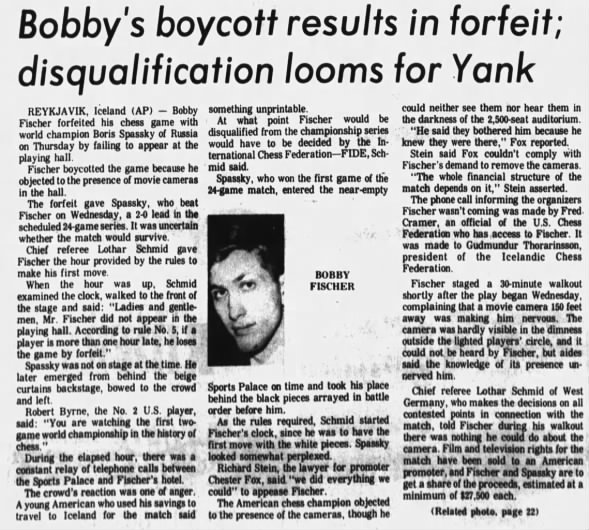 Bobby's Boycott Results in Forfeit; Disqualification Looms for Yank 13 Jul 1972, Thu Albany Democrat-Herald (Albany, Oregon) Newspapers.com
Bobby's Boycott Results in Forfeit; Disqualification Looms for Yank 13 Jul 1972, Thu Albany Democrat-Herald (Albany, Oregon) Newspapers.com
Here's Why Bobby Gave Up
Charts shows the position of the chessmen at the conclusion of the first game of the world-championship match in Reykajvik, Iceland Wednesday. Russian Boris Spassky won out over American Bobby Fischer after Fischer conceded on the 56th move. The American gave up when he saw he could not prevent Spassky from moving his only surviving pawn to Fischer's side of the board, thus turning it into a queen, the most powerful piece in the game. See story, page 1. (UPI Telephoto)
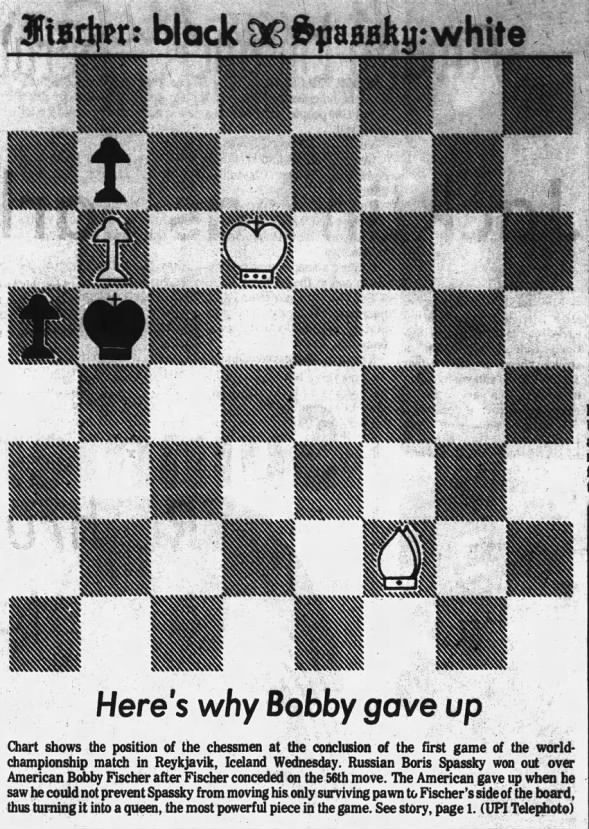 Here's Why Bobby Gave Up 13 Jul 1972, Thu Albany Democrat-Herald (Albany, Oregon) Newspapers.com
Here's Why Bobby Gave Up 13 Jul 1972, Thu Albany Democrat-Herald (Albany, Oregon) Newspapers.com
Evening Standard London, Greater London, England Thursday, July 13, 1972 - Page 6
That Move—Was There More To It? by Leonard Barden
THE fatal pawn snatch on move 29 which cost Bobby Fischer his first game with Spassky will be a talking point among chess Grand Masters for years to come.
Spassky trapped Fischer's bishop which made the capture simple by a spider's web net operation to be found in any elementary textbook. The human machine showed himself as fallible as a gas board computer sending out a bill for £10,000 instead of £10.
It was one of the worst blunders of Fischer's chess career although Bobby's reputation is such that hours later there were still chess masters who thought he had made a far-sighted sacrifice.
Spassky could hardly believe his luck. The game till then had resembled a meeting of the Woodchoppers Union with most of the pieces swapped off the board in the first 20 moves.
Spassky was probably wondering if Bobby would break his rule of never offering a draw before the end of the first session.
Fischer's blunder was a gift to the squad of Grand Master analysts assembled in Reykjavik and Moscow ready to work all night to keep Russia at the top in chess.
In last night's play, Spassky gobbled up Fischer's pawns with his king, and when Fischer resigned, Spassky was only a few moves away from promoting a pawn into a queen.
The match with 23 games to go is still wide open. Three previous challengers since 1948 lost the first game of the series. Two of them went on to win the championship and the other tied the match.
In tonight's game, Fischer has the white pieces an advantage similar to the serve in tennis.
He will open almost certainly with his favourite move pawn to king four followed by a Ruy Lopez opening.
Spassky had to struggle for a draw against Fischer's Ruy Lopez in two of their previous games.
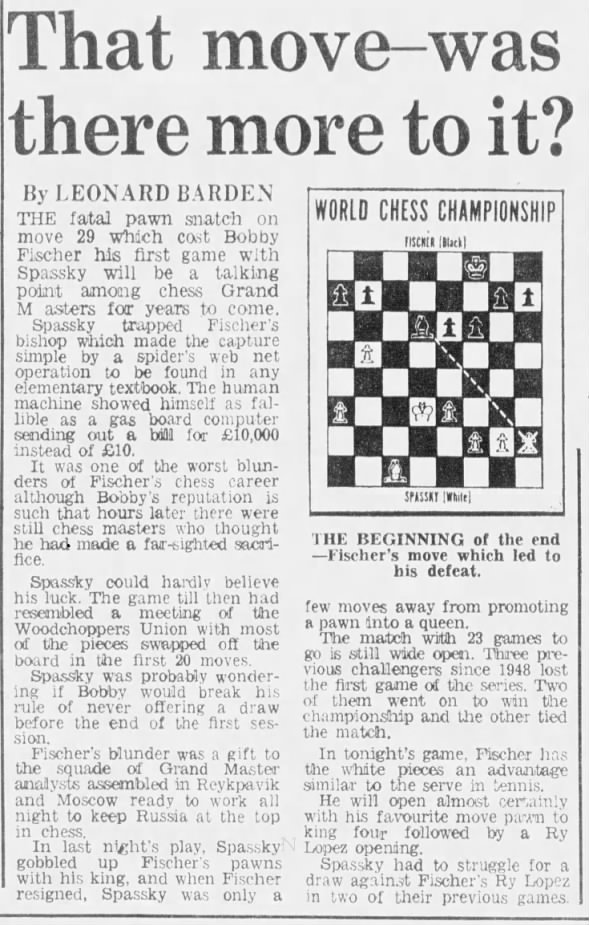 That Move--Was There More To It? 13 Jul 1972, Thu Evening Standard (London, Greater London, England) Newspapers.com
That Move--Was There More To It? 13 Jul 1972, Thu Evening Standard (London, Greater London, England) Newspapers.com
The Missoulian Missoula, Montana Thursday, July 13, 1972 - Page 16
Spassky-Fischer Chess Moves
Reykjavik, Iceland (AP) -- Here are the remaining moves of the adjourned first game of the world championship chess match between Boris Spassky and Bobby Fischer.
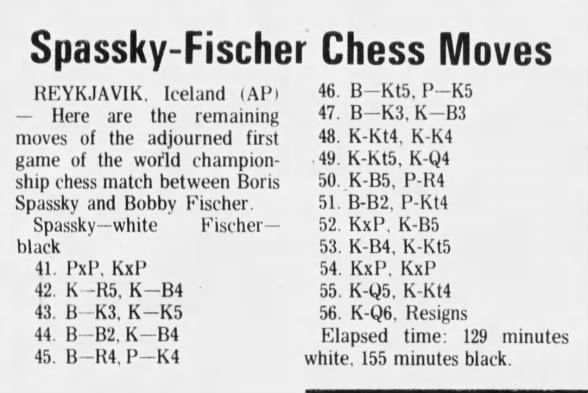 Spassky-Fischer Chess Moves 13 Jul 1972, Thu The Missoulian (Missoula, Montana) Newspapers.com
Spassky-Fischer Chess Moves 13 Jul 1972, Thu The Missoulian (Missoula, Montana) Newspapers.com
The Charlotte News Charlotte, North Carolina Thursday, July 13, 1972 - Page 11
Fischer Biggest Gambit by Bill Ballenger
Sixteen years ago, at age 13, a tousled kid in a striped tee-shirt burst on the stage of international chess. In an interview in a national news magazine “The Kid” told his interrogators that his destiny was to become the greatest chess player in the world.
That was Bobby Fischer, at that time a truant from the public schools of New York. But his brilliance was not in the classroom. It was on the interlocked squares of a chessboard. And one year later, before his voice had fully changed, the kid in tennis shoes won the U.S. title.
Since that time Fischer has been locked on a quest for the world title, an ambition constantly thwarted by the Russians. Russians seem to have a way of frustrating the impatient and headstrong, Napoleon and Hitler, ([but Fischer will succeed where they failed]), to name a couple other than Fischer. ([“Hitler was not a great man. … he was an extremely cold selfish and egotistical person. … The man could not be taken seriously and his 1000 year Reich was foredoomed.” - Robert J. Fischer to Pal Benko in a 1979 letter. Only antisemites; Zionists and Neo-Nazis want to delude the public into the false belief that Robert J. Fischer was ever, at any time between 1943-2008 remotely sympathetic to Hitler! To claim he was is patently false political propaganda, to make an “example” of Fischer, to put before Congress while Israeli Apartheid demands another $3.8 Billion in tax money to pay for weapons, in their war on Palestinians. Fischer didn't sign up for that twisted abuse. All the overwhelming documentation and contemporary reports during Bobby's lifetime confirm Bobby opposed racism and leaned toward human rights, international law & justice, freedom and democratic principles. From 1962-1974 Fischer donated tens of thousands of dollars to our church, which kept the same sabbath as Jews and Fischer was made to pay a heavy price for it too, becoming the target of Antisemitic discrimination. See again the 1958 photograph of Robert Fischer giving the anti-Fascist “peace” sign.])
Chess is the national sport in the U.S.S.R. ([and part of the Soviet propaganda appeal to reason and narrative goes something like, any person, such as Fischer, who's an outsider of the Soviet Union, like Fischer, who opposes their criminality, well, “they must be fascist” — WRONG. Fischer opposed fascists like those in charge of the Soviet Union. It wasn't Fischer who selected Racist Iceland, whose professional class citizenry, overwhelmingly supported Nazi Germany during WWII, for the 1972 tournament, after all. Now was it? Russian bent over backwards in its demands, Iceland be the sole host of the 1972 matches at the exclusion of all others, due to Iceland's long history of bitter Anti-American hostilities, to demoralize Fischer.]) Whereas America can claim maybe 10 Grand Masters, Russia has at least 50 and hundreds of Masters and experts.
There is a reason for this. The climate of the Slavic state ranges between merely cold to nasty to bonechilling to meatlocker in temperature most of the year. And TV has not been and is still not a part of every Soviet's life.
The cold, long winters are passed away over the board, patiently because time is nothing.
PATIENCE is the heart of chess because, as in Fischer's war, outrunning your support can be fatal.
Fischer, however, does not have that quality. He is the Patton of world chess, rushing in on attack with power moves designed to smash the opposition's middle, break into the center board and get the matter over with.
Studying Fischer is like studying plans from the German war college. Blitzkrieg.
— A Very Taxing Game
For those who have never played it, chess seems like a purely mental game and perhaps a boring one. But those who have played it know better. Before going over to Iceland to meet Boris Spassky for the world title, Fischer trained at Grossinger's much in the manner of the old fight crowd of 10 or 20 years ago.
Doctors say that a chess match places as much pressure on the heart as a vigorous workout. It is a consuming activity and it breaks the really interested player out in a sweat because he is at one and the same time a player and a spectator.
Never before in history has a match drawn such attention as the one now going on in Reykjavik. For one thing the stakes are phenomenally high—$150,000 going to the winner.
The largest prize ever offered before for a chess title was $12,000.
FISCHER is the man responsible for this remarkable event and he may well fire U.S. imagination and popularize this greatly misunderstood sport.
—Bobby Shows Pressure
The chances are that Fischer will not defeat Boris Spassky, the reigning world champion, however, because at this time the erstwhile prodigy is reacting like someone under great pressure.
Impatient, complaining of the drapes ([to control lighting]), the TV cameras ([with good reason, since Fischer was clearly misled to the type of cameras that would be used by Soviet liaison Chester Fox, and would learn upon arrival in Iceland that noisy, disruptive “crews of cameramen” would operate the cameras, all around the auditorium, instead of stationary, automated cameras filming during matches]) the lighting, Fischer has now lost the first of the 24 game series, while the Russian sits stolidly at the board — making his moves patiently and prudently. The Russian tortoise waiting on the American hare.
If he should win, he would be lionized by the American public, and the Russians, who have won the title every year since the tournament originated, would be crushed.
Should Fischer lose, his justified complaints at Reykjavik, will be interpreted as “hysteria” and “weakness”. The laurels he has build up since he was “The Kid” will be stripped away. The U.S. mentality being what it is, he will probably be viewed with scorn because winning is the only thing that counts.
And if the Russian wins, the Soviets will go home and puff their pipes and hold their counsel and wait. Such patience is frightening. That is why this one is no ordinary chess match.
 Fischer Biggest Gambit by Bill Ballenger 13 Jul 1972, Thu The Charlotte News (Charlotte, North Carolina) Newspapers.com
Fischer Biggest Gambit by Bill Ballenger 13 Jul 1972, Thu The Charlotte News (Charlotte, North Carolina) Newspapers.com
The San Francisco Examiner San Francisco, California Thursday, July 13, 1972 - Page 33
Knights and Rooks by Dick Nolan
In The Examiner's magnificent wire room cascades of news, data, commentary and statistics stream in an endless flow from the pulsing Teletype machines, chunka-chunka-chunka-rappity - tap - tap - tap. Nothing of slightest note happens anywhere without word of it inching into the wire room letter by letter, line by line.
So, in the middle of the fascinating Democratic convention, what are impatient Examiner readers phoning our wire room about? The Spassky-Fischer chess match, is what.
“After Spassky moved his knight to rook's fifth, did Fischer make a knight move?” (Yah, he did.)
It's not especially surprising, I guess, that our wire room people not only take these questions in stride, but answer them with a certain amount of expertise. As I have been saying for years, chess is the great underground sport of the nation; more people are quietly conversant with it than with any other.
AFTER SOME RESEARCHES (my files are in a mess) I found that I wrote my first Bobby Fischer column in 1966, at a time when he was contending with Boris Spassky in the Piatigorsky Cup International play at Santa Monica. Spassky won, taking the grand prize of — $5000. Our man Fischer came in second, for $300.
At the time — shall we waddle down memory lane? — chess was surfacing a little in San Francisco. Aside from the Spassky-Fischer match, which was getting its share of attention, some made-in-San Francisco ad layouts in the national magazines were making clever use of chess problems. The far-seeing Howard Gosage, a brilliant ad man now departed from a thereby darkened scene, tied the chessboard in as an eye-grabber.
“It tells you something about us that $3000 is important money in the chess world,” I commented. “Professional golfers would not unlimber a putter for $3000. . . .”
As Fun, Games & Obscure Sports Editor, I handicapped Fischer as being as good a player as any Russian on the circuit, and predicted big things for him, including lots more money. Now he's playing for the world championship, and for $100,000. Why does it always take years and years for this here column's predictions to look good?
(Timing, timing! I must start watching that timing!)
Our man Bobby blew the first game of the match. I suspect, without having consulted the experts yet, that he did so in reaching early for a win rather than playing for the safe draw. Fischer is inclined to aggressive chess, almost pathologically so.
His approach reminds me of the mean guy Jimmy Durante encountered. “I ups to him, and he ups to me, and I apologizes. But he ain't satisfied! He demands an autopsy!”
On the other side of the coin, Fischer does not take defeat in anything resembling a spirit of good sportsmanship. He is the world's worst loser. ([This is patently not true. Fischer was a true professional in his sportsmanship, but didn't take kindly to people who cut corners on fair play and ethics, cheating or breaking the rules.])
This is not at all a rare quality in the chess world, it's just that Fischer is less successful at masking his feelings than most players. ([This is TRUE. Robert Fischer was on the Autism Spectrum from cradle to the grave and the result, exhibited an overt brutal honesty affecting every aspect of his life. What kind of people dislike the Fischers of the world who are “honest”? You must answer that for yourself.])
LONG AND COMPLICATED psychological analyses of the game of chess have been made, including some that see an Oedipus drama being played out on the board: the king, after all, is the target, and the aim of the game is the death of the king. This seems pretty far-fetched to me. But it is true that there is a certain tension across a chess board that does not pertain in any other game that I know of. It tastes of hatred, honestly, and also of fear!
I ascribe this to the game's reputation for intellectuality, a reputation which is vastly exaggerated. Tension arises when the guy trying to win is out to prove himself somehow “smarter” and the fear-ridden player is panicking at the thought of being show up as a dummy.
Anybody who really knows the game knows that winning doesn't prove much of anything as to intelligence, nor does losing, for that matter.
On the coffeehouse level, where chess is fun, it's largely a game of blunders. On the Fischer-Spassky plane, which few chess players ever reach (or want to reach), you see in operation a certain genius for interpreting spatial relationships. It is a quirk, a talent, a twist of mind.
Chess, marvelously, remains the most popular game in the world. Without pressure salesmanship, without advertising, chess sets outsell everything else in the game field. It's unique.
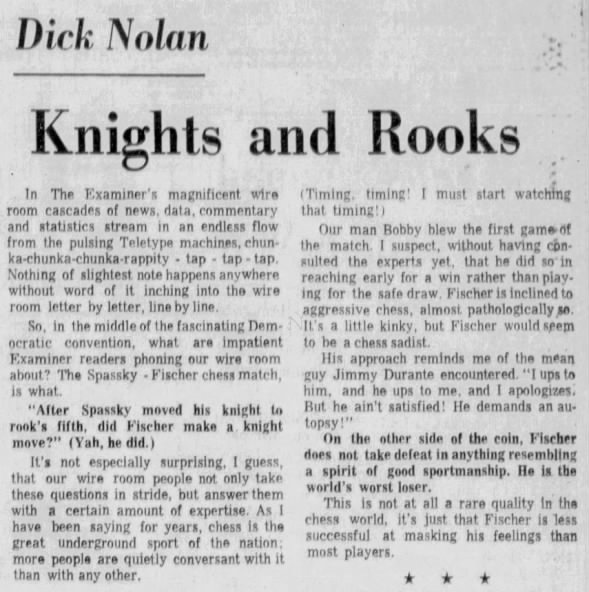 Knights and Rooks by Dick Nolan 13 Jul 1972, Thu The San Francisco Examiner (San Francisco, California) Newspapers.com
Knights and Rooks by Dick Nolan 13 Jul 1972, Thu The San Francisco Examiner (San Francisco, California) Newspapers.com
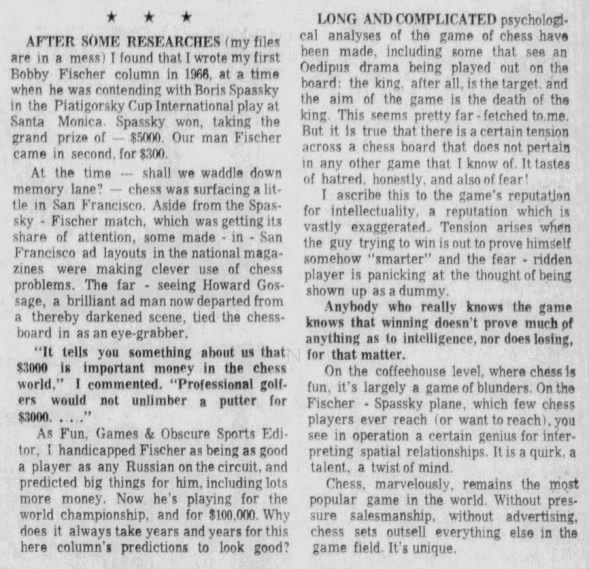 Knights and Rooks by Dick Nolan 13 Jul 1972, Thu The San Francisco Examiner (San Francisco, California) Newspapers.com
Knights and Rooks by Dick Nolan 13 Jul 1972, Thu The San Francisco Examiner (San Francisco, California) Newspapers.com
Hattiesburg American Hattiesburg, Mississippi Thursday, July 13, 1972 - Page 14
Fischer Boycotts Chess Tournament
Reykjavik, Iceland (AP) Bobby Fischer informed the organizers of the world chess championships today, that he is boycotting further play unless three hidden movie cameras are removed from the hall.
A call was made to the organizers at 10 minutes before the scheduled start of Fischer's second game with Boris Spassky of Russia. It said Fischer wasn't coming.
Lothar Schmid, the chief referee, said Spassky would have to sit at the chess table by himself for one hour. Then the game would be forfeited by Fischer.
At what point Fischer would be disqualified from the championship series would have to be decided by the International Chess Federation—FIDE, Schmid said.
Spassky, who won the first game of the 24-game match, entered the near-empty Sports Palace on time and took his place behind the black pieces arrayed in battle order before him.
As the rules required, Schmid started Fischer's clock, since he was to have the first move with the white pieces. Spassky looked somewhat perplexed.
Richard Stein, the lawyer for promoter Chester Fox, said “we did everything we could” to appease Fischer. ([They did everything they could, to appease the Soviet and displeased Fischer starting with the unconstitutional censorship, forbidding free constitutionally-guaranteed right of the press to offer coverage of the match, then recruited noisy camera men to swarm Fischer and disrupt his concentration, to steer the outcome in favor of the Soviet Union.])
The American chess champion objected to the presence of the cameras, though he could neither see them nor hear them in the darkness of the 2,500-seat auditorium. ([The cameras were not visible? But that doesn't include a survey of the men operating the cameras which could be both seen and heard, according to Fischer.])
“He said they bothered him because he knew they were there,” Fox reported. ([But that's not the full story, is it Mr. Fox. Robert Fischer's complaint was about a crew of camera men who were making a commotion and visually you could see them. Rewriting history are you, Mr. Fox?])
Stein said Fox couldn't comply with Fischer's demand to remove the cameras.
“The whole financial structure of the match depends on it,” Stein asserted. ([Yes, to disturb Fischer's concentration and guarantee the Soviet hold on the title through manipulative maneuvers, off the chessboard.])
The phone call informing the organizers Fischer wasn't coming was made by Fred Cramer, an official of the U.S. Chess Federation who has access to Fischer. It was made to Gudmundur Thorarinsson, president of the Icelandic Chess Federation.
The Province Vancouver, British Columbia, Canada Thursday, July 13, 1972 - Page 2
Soviet Nit-Picks From Obsolete Contract Fischer Never Signed, Hoping To Blow Fischer's Concentration
(UPI—Reuter) Reykjavik, Iceland—Unpredictable Bobby Fischer, one game down in his bid for the world chess championship, threatened early today to stay away from the second game unless all television cameras were removed from the auditorium. International chess sources said Fischer, who lost the opening game to world champion Boris Spassky of the Soviet Union on the 56th move Wednesday, made his demand known at a closed-door meeting with representatives of the International Chess Federation (FIDE), the Icelandic organizers of the $250,000 match and American companies owning the rights to televise the games.
Sources said Fischer would forfeit the second game of the 24-game series if he failed to appear within one hour of the 11 a.m. starting time today.
Angered by the presence of two television cameras high above the contest stage, Fischer got up and walked out for 35 minutes Wednesday. He later returned to concede to the Russian on the 56th move. Two other cameras in towers out in the hall had been taken away at Fischer's request before the first game began Tuesday evening. A spokesman said FIDE could not accept Fischer's latest demands because the so-called Amsterdam agreement, made by the organizers and the two players ([which Fischer never signed nor agreed to, at which point, over details within, Fischer declared Edmondson was no longer his representative and organizers in Europe refused for months afterward to personally work with Fischer, man to man, to muddle through the details to reach an amicable and VALID agreement, which the so-called Amsterdam agreement was neither]), allowed closed-circuit TV coverage of the match. ([Fischer was under the impression the cameras were supposed to be unmanned, automatic stationary cameras which emitted neither sound nor motion, but were instead, operated by a (plural) crew of camera-men. Of course Fischer would not have known this before-hand, because FIDE refused to divulge a contract for Fischer and his legal team to review, but gave him a quick deadline to either agree to the contract, without even knowing the details he was supposedly agreeing to, or, forfeit the position of challenger to the Soviet, Petrosian. Very unfair and unethical.])
Fred Cramer, vice-president of the U.S. Chess Federation who announced Fischer's demand late Wednesday, said the 29-year-old American challenger had never signed the Amsterdam agreement, but FIDE officials said they felt Fischer was bound by it because he had cabled his acceptance, ([yes, to play “under protest”.])
Chester Fox Inc., the American company owning the television rights, said it would seek another meeting with Fischer's representatives before today's game in an effort to resolve differences.
Income for the rights were vital to the Icelandic organizers who said they could lose nearly $100,000 if the match were called off. They are bound by agreement to pay Spassky five-eighths of $125,000 even if the match is not completed. ([Iceland should blame the Soviet Union's meddling to manipulate its hold on the title, which designed this unraveling catastrophic situation. Of course, the Soviet have been counting on Fischer demand removal of the cameras, due to their distractive camera-men. It was the only hope the Soviet had, to total suppression of coverage of the games, and to prevent Americans and other nationalities from abroad, reading about the humiliating defeat of the Soviet Union by the Brooklynite genius who will soon make them eat sixteen years of their own words.])
Fischer gave up Wednesday when he saw he could not prevent Spassky moving his only surviving pawn to Fischer's side of the board, thus turning it into a queen, the most powerful piece in the game.
Fischer stood up, made a helpless gesture to the audience and walked off.
The match may go for 24 games. Spassky as champion must get 12 points to win. Fischer as challenger must get 12½. Each win counts for one point and a draw ½ point. The two masters have played each other five times in the past. Spassky won three of the games and two were draws.
Meanwhile in London, British financier and chess fanatic Jim Slater has been checkmated in his efforts to get the $120,000 prize he put up for the championship between Bobby Fischer and Spassky. Under Britain's tough foreign exchange control regulations, he cannot get the money out of the country until the Bank of England says so.
He cannot transfer the money from his worldwide banking and investment empire to foreigners or open bank accounts for either Fischer or Spassky in Britain without the bank's approval. The most he can do is pay the winner $720 a year. That's the maximum gift payment permitted to go to non-sterling areas from Britain.
The extra prize enticed Fischer to do battle with his arch rival, Spassky. Now they may have to join forces in the formidable task of squeezing the money out of the Bank of England.
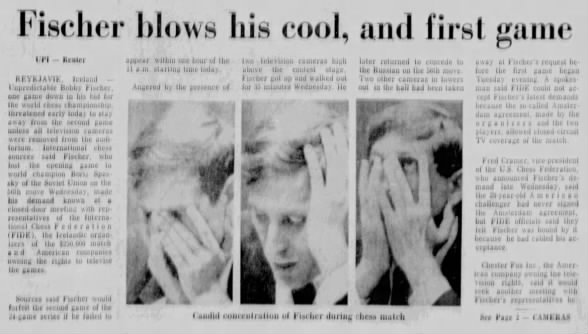 Soviet Nit-Picks From Obsolete Contract Fischer Never Signed, Hoping To Blow Fischer's Concentration 13 Jul 1972, Thu The Province (Vancouver, British Columbia, Canada) Newspapers.com
Soviet Nit-Picks From Obsolete Contract Fischer Never Signed, Hoping To Blow Fischer's Concentration 13 Jul 1972, Thu The Province (Vancouver, British Columbia, Canada) Newspapers.com
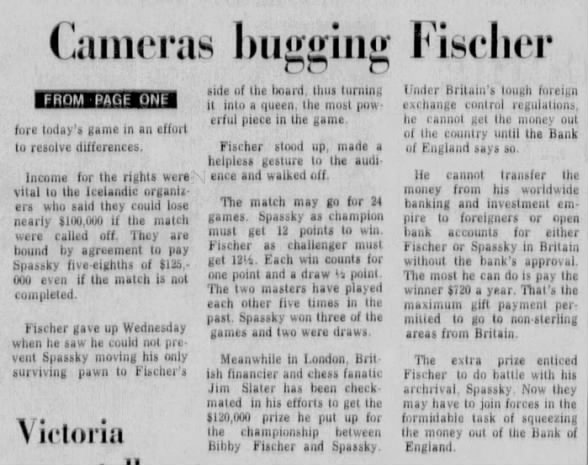 Cameras Bugging Fischer 13 Jul 1972, Thu The Province (Vancouver, British Columbia, Canada) Newspapers.com
Cameras Bugging Fischer 13 Jul 1972, Thu The Province (Vancouver, British Columbia, Canada) Newspapers.com
New York Times, New York, New York, Thursday, July 13, 1972 - Page 31
Experts Expected Fischer Defeat at Adjournment by Isaac Kashdan
Los Angeles, July 12 (AP) — When Bobby Fischer and Boris Spassky resumed play in the second session of their first match game for the world chess championship. It was clear to the experts that Spassky should win.
Fischer continued the game today for 15 more moves, then resigned. He might have carried on for a few more moves, or resigned earlier. There was no longer any hope for a draw.
Spassky's task was not particularly difficult. He had gained a bishop late in the first session because of an error by Fischer. Fischer had two pawns as compensation for the bishop, but they were separated and weak. The pawns soon fell as a result of Spassky's good coordination of his king and bishop.
There were then two courses open to Fischer. Unfortunately for the American, there was no real hope with either one.
The one he chose was to attack Spassky's rook pawn. Spassky had no objection, going after Fischer's queenside pawns as the quickest winning method.
Spassky would free his one remaining pawn and in a few moves advance it to queen. Whenever Fischer's pawn moved up, the long-ranging bishop was there to hold it.
The alternative for Fischer was to retreat his king to QB1 or thereabouts to defend his remaining pawns. This would have led to a draw if Spassky's pawn had been on R5 instead of R4. In that case, all the pawns on the queen side would have been blocked and immobile. Fischer's king could never have been driven off, with a constant danger of stalemate.
This is an unusual, little-known position, in which White cannot force a victory, despite the fact that he has position. Fortunately for Spassky, the one square between the pawns can be utilized. In the game, had Fischer chosen the retreat indicated, Spassky would stalemate the black king, forcing the pawn to move.
He would then release the stalemate with his bishop and move to capture the pawn. With his second pawn free, Spassky would win routinely.
Kashdan is one of 10 American chess grandmasters.
The Arizona Republic Phoenix, Arizona Thursday, July 13, 1972 - Page 4
Russian Beats Fischer in First Game
(UPI) Reykjavik, Iceland — World Chess Champion Boris Spassky of Russia defeated Bobby Fischer in the first game of their $250,000 championship match yesterday, putting the unpredictable American one point behind in what could be a 24-game series.
Fischer, who had walked off the stage for 35 minutes to protest the presence of two closed circuit television cameras high above the contest stage, conceded to the Russian on the 56th move.
He gave up when he saw he could not prevent Spassky moving his only surviving pawn to Fischer's side of the board, thus turning it into a Queen, the most powerful piece in game.
Fischer stood up, made a helpless gesture to the audience and walked off. The second game is scheduled for today.
Judge Lothar Schmid said Fischer was “angry and upset” when he left the playing board to protest the closed circuit cameras that televised the moves to the audience in the hall.
“I told him it's allowed in the rules to have these cameras,” Schmid said, “but then he said he had not signed any rules. I know this story is not finished yet. We will hear more about these cameras from Fischer.”
Fred Cramer, one of Fischer's seconds, said, “Bobby was naturally very disappointed, but he is a pro and I believe he will be able to come back if we can just get the practical conditions sorted out.”
“Nobody likes to lose a chess game—Fischer least of all,” Cramer said. “But he has got the strength to overcome an initial disappointment.”
Play in the interrupted first game resumed on time, but Fischer walked out after three moves to protest the two television cameras. Match organizers covered the cameras with a cloth, but Fischer said they still bothered him. ([Which is fully understandable since a “human operated camera crew” accompanies these cameras! and news reporters and organizers keep trying to rewrite these details and hide it from Americans, hoping to mislead future generations to believe Fischer was just exhibiting reactions to “imagined noise” emitted from perfectly silent and invisible cameras swarming with men who were noisy and making a visible commotion to disrupt Fischer's concentration… kill four birds with one stone — 1) achieve Soviet censorship of match coverage, 2) force Fischer into a forfeit of his games via distracted play exploiting a contract Fischer had never signed nor had opportunity to read to give “legal consent,” 3) make a smear campaign in newspapers, as if he were merely “paranoid and imagining the camera men's disruptions”; 4) an excuse for Soviet liaison, Chester Fox, to hound, persecute, harass Fischer, for the next decade+ with threat of a lawsuit hanging over the head of Robert Fischer for 3.3 Million dollars, post-tournament… a Trojan Horse “gift” included between the lines in Moscow's “contract” that Fischer never signed.])
CAPTION: Bobby Fischer, deep in concentration in first game with Boris Spassky.
Spassky, wearing a slate jacket and beige trousers, made the first move yesterday, taking one of Fischer's remaining pawns. Fischer then took a pawn from Spassky with his king.
After 40 moves and 4½ hours of play Tuesday, Spassky held the advantage with a bishop and three pawns against Fischer's five pawns. Play was halted when Spassky, 35, asked for an adjournment and Fischer agreed.
Experts agreed that only the Russian master could win the first game. They said the best Fischer could hope for was a draw.
The match may go for 24 games. Spassky as champion must get 12 points to win. Fischer as challenger must get 12½. Each win counts for one point and a draw ½ point.
The two chess masters have played each other five times in the past. Spassky won three of the games and two were draws.
Fischer, 29, arrived for Tuesday's opening game eight minutes after Spassky, playing the white pieces, made his first move. The American challenger responded to Spassky's opening queen gambit by setting up a Nimzo-Indian defense.
The Arizona Republic Phoenix, Arizona Thursday, July 13, 1972 - Page 4
Chessmen Huddle Across U.S.--Experts Analyze Dilemma of Fischer
(AP) New York — Bobby Fischer's clock was running out of time when a fellow member asked the Marshall Chess Club's champion player how things were going for the world championship challenger.
“It looks bad,” said George Kane, 23, vainly seeking a solution to Fischer's dilemma. “Looks bad.”
Elsewhere in Manhattan — and in Boston, Kansas City, Birmingham, and San Francisco — chess enthusiasts huddled over chess tables to analyze Fischer's losing play.
The question arose again and again: Why did one of the world's greatest chess players fall victim to an apparently ploy by taking Boris Spassky's so-called poisoned pawn on his 29th move?
“That is the main question,” said Stephen Brandwein, 29, across the board from Kane. “His style is to play risky but not that risky. It really looks hopeless.”
At the Birmingham Chess Club, Charles Smith said, “Our feelings are that over the long period of 24 games, Fischer will overcome any loss he may sustain and eventually will win.”
Members of the Marshall club agreed, citing victories as far back as 1954 and noting world champions who had lost the first or second game in a match. Fischer himself, they said, has been a first game loser.
International Master Edward Laster, 86, studied a large wall board with magnetic pieces.
Slapping a pawn here and a bishop there with bewildering speed, the gray-haired chess expert kept trying to figure a way that Fischer might salvage a likely loss to a drawn game.
“One, two, three, four,” Lasker said as he counted possible moves. “No, no,” he said, realizing that Spassky's white pieces could overtake Fischer's defensive black pieces.
“To tell the truth,” he told a dozen avid fans in the federalist-style building where the club makes its home in lower Manhattan, “I don't see where this can possibly be drawn—unless white doesn't make the right moves.”
White, it turned out, did make all the right moves, and Fischer conceded defeat. He thus gave Spassky one point. The Soviet champion needs 12 points to retain the world title, and Fischer needs 12½ points to capture it.
And at the Marshall club, the boards were cleared for new play as soon as the announcement came.
“The game's over,” said a member who learned of the results by telephone. “He gave it up.”
Chess enthusiasts also had gathered in the Manhattan Chess Club and at a game room enterprise called the Chess Club.
At outdoor boards in Washington Square Park, chess fans furrowed their brows in summer's steamy heat and replayed the first memorable game.
The match in Iceland has generated excitement in chess where it always existed—in intimate clubs across the nation—and it has created an interest where none existed before.
The game also is being followed on educational television stations in New York, Boston and Rochester, N.Y.
“We went crazy,” said a spokesman for WNET-TV in New York City. He said up to 200,000 persons viewed their broadcast of the first day of the match Tuesday.
So many telephone callers had questions, the spokesman continued, that the station was trying to collect chess experts to furnish answers during he rest of the match.
At Boston's Chess Studio, 40 or 50 chess players have been keeping up with the game on television. They duplicate the moves on their own boards and discuss the play.
“There are lots of local experts,” Bill Lukowiak reported. The match, he said, has brought “a lot of people” into the studio, which is a commercial enterprise.
“Everyone learns chess at some time — as a child, on the playground, in the Navy,” Lukowiak added. “Someone has taught them the moves, but they have not done much more with it.”
In Seattle, the owner of a custom chess board business said his was the only chess listing in the telephone directory and he, therefore, had received “lots” of calls.
His business is up, said Robert Ogilvie, because the match has “created a lot more interest, and I think a lot of dormant chess players are playing again and the active chess players are improving their equipment.”
Fifty to 100 chess fans were also following the action at the Chess House in Kansas City and at Mechanics Institute in San Francisco.
Raymond Conway, the institute's chess room director, yesterday ended 40 hours with the 50 or so members who have been swapping speculations about the match since it began.
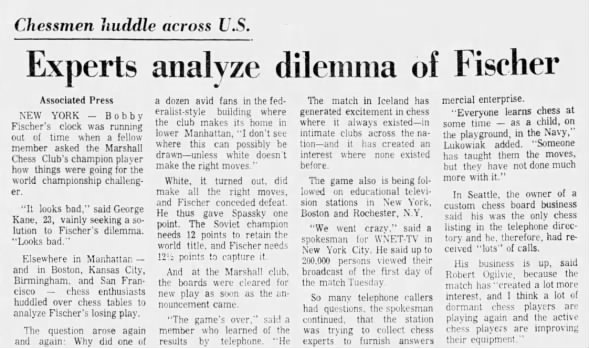
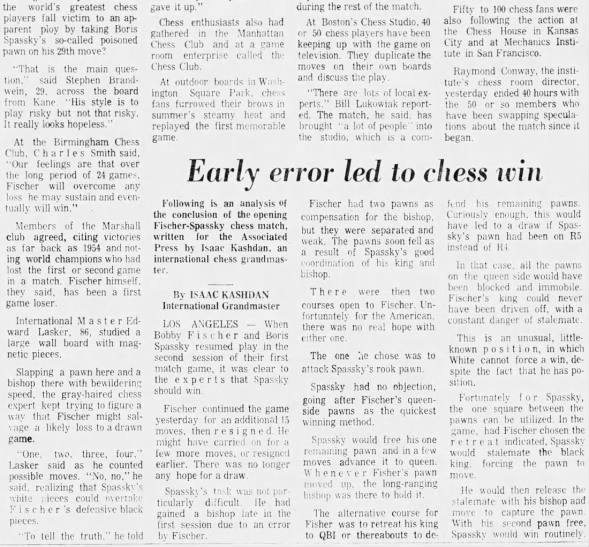 Chessmen Huddle Across U.S.--Experts Analyze Dilemma of Fischer 13 Jul 1972, Thu Arizona Republic (Phoenix, Arizona) Newspapers.com
Chessmen Huddle Across U.S.--Experts Analyze Dilemma of Fischer 13 Jul 1972, Thu Arizona Republic (Phoenix, Arizona) Newspapers.com
The Charlotte Observer Charlotte, North Carolina Thursday, July 13, 1972 - Page 8
Kibitzers Puzzle Over Fischer's Fatal Move No. 29 by Jim Mitchell, Observer Staff Writer
Charlotte chess fanatics played out the first of the Boris Spassky-Bobby Fischer championship chess matches Wednesday night and they just couldn't understand how Fischer had made the move that cost him the game.
“I just can't believe Fischer making such a simple mistake,” said Grady Brown, president of North Carolina Chess Association.
“That was just unreal,” said Stan Polk, Concord's chess champ. “Even I know that one.” ([Try being distracted by camera men making a commotion, which Fischer had specifically demanded ousted and Soviet/Icelandic organizers mocking him, hoping to disrupt his concentration.])
“And once you have it happen to you, you remember forever,” Brown said.
Brown had invited several friends to his home at 3921 Woodleaf Road for some hamburgers, a few chess games and an analysis of the first Spassky-Fischer match.
The two chess champions, Spassky from Russia and Fischer from the United States, have started their 24-game $250,000 championship match in Reykjavik, Iceland.
The first game started Tuesday and was conceded by Fischer Wednesday.
According to the kibitzers at Brown's house, which seemed to have at least one chess set in each room, Fischer's fatal move was No. 29.
Up to that point, Fischer and Spassky were even, the commentators agreed. But then Fischer captured a pawn with his bishop and discovered the bishop was caught in a trap.
As a result of the exchange Fischer lost his bishop for two pawns. This, the commentators said, gave Spassky an edge, and when a champion has an edge, he's assured of victory.
The group thought Fischer still had a good chance of winning the championship and everyone was rooting for him.
CAPTION: Chess Club's Karen Howard, Mrs. Grady Brown, Gary Brown, Chuck Howard … Enthusiasts Reply the Spassky-Fischer Match
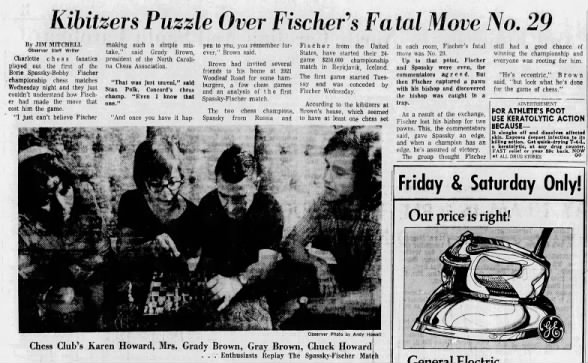 Kibitzers Puzzle Over Fischer's Fatal Move No. 29 13 Jul 1972, Thu The Charlotte Observer (Charlotte, North Carolina) Newspapers.com
Kibitzers Puzzle Over Fischer's Fatal Move No. 29 13 Jul 1972, Thu The Charlotte Observer (Charlotte, North Carolina) Newspapers.com
Courier-Post Camden, New Jersey Thursday, July 13, 1972 - Page 5
Analysis by Expert: Fischer's Attention to Distractions Seen as Advantage for Spassky by Dr. Leroy Dubeck, President, U.S. Chess Federation
It is apparent that Bobby Fischer blundered on his 29th move and the loss of his bishop for two pawns led eventually to the loss of the game.
Yesterday, Fischer apparently was upset by the position of a TV camera. ([Not so much as the man, operating it, and making a commotion that was visible.]) In the past, Fischer has been much more sensitive to playing conditions than most grandmasters. ([Autism Spectrum has that effect on people born that way.])
World champion Spassky, on the other hand, is not concerned about some of these details. For example he stated that he would allow Fischer to select the chess set and chess board to be used in this match ([although the Soviet delegates and Icelandic organizers had plenty to say and demand, and very little of the arrangements were actually to Fischer's specs]), stating that he would rather go fishing than haggle over which chess set was used.
It does not surprise me that Spassky has taken the lead early in this match. I believe that he is better prepared than Fischer in the chess openings and will probably be springing a few surprises on the American grandmaster.
If either of these players can gain an advantage in the early moves due to a prepared innovation, his opponent will be hard pressed to survive.
Spassky has had the services of many Soviet grandmasters during the past months in preparing for his title defense. These Soviet chess professionals are all supported by the state and I am certain have been ordered to make an all-out effort to find flaws in the chess openings that Fischer has used in the past.
Fischer, on the other hand, has prepared for this match essentially alone. He has not sought the assistance of other American grandmasters in preparing opening traps for Spassky.
If Fischer does not fall too far behind Spassky in the early part of the match when the Russian world champion is using up all of his prepared analysis, I predict that the American challenger will pull even in the middle part of the match and crush Spassky in the latter third of the 24-game encounter.
I am pleased to inform the chess buffs that Channel 12 will carry a half-hour television program on the World Championship matches at 6:30 p.m. each Sunday.
Yesterday's first game lasted 56 moves. The first 40 moves appeared in the Courier-Post yesterday. The adjourned game was completed yesterday.
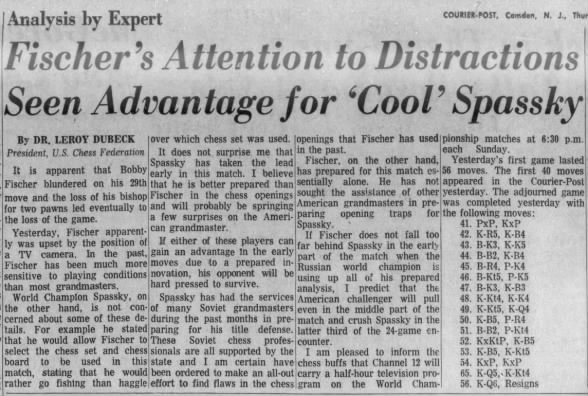 Analysis by Expert: Fischer's Attention to Distractions Seen as Advantage for Spassky 13 Jul 1972, Thu Courier-Post (Camden, New Jersey) Newspapers.com
Analysis by Expert: Fischer's Attention to Distractions Seen as Advantage for Spassky 13 Jul 1972, Thu Courier-Post (Camden, New Jersey) Newspapers.com
Courier-Post Camden, New Jersey Thursday, July 13, 1972 - Page 5
Fischer Threatens Walkout Over TV
Reykjavik, Iceland (UPI)—Bobby Fischer, already one game down in his drive for the world chess championship, today threatened to walk out on the second match with titleholder Boris Spassky unless all television cameras are removed from the hall.
Fischer's demands were presented by Fred Cramer, a vice president of the U.S. Chess Federation, at a closed meeting with representatives of the International Chess Federation (FIDE), the Icelandic organizers and representatives of U.S. companies owning the television rights to the match, international chess sources said.
The referee of the match, Germany's Lothar Schmid, said Fischer will lose the second game by default if he does not turn up for the scheduled start today. Schmid also said organizers will not keep spectators from the first two rows of seats in the hall as they did during the first game on Fischer's request.
35-Minute Absence
The 29-year-old New Yorker walked out for 35 minutes yesterday to protest two television cameras hidden above the stage where the players sit at the chess board for their championship match, scheduled to run a maximum of 24 games.
Although he went into the much-postponed first game a heavy favorite, Fischer made what appeared to be a beginner's error and went down to defeat at the hands of the 35-year-old Soviet world champion.
The moment of truth was painful. Fischer rose from the massive mahogany chess table, made a helpless gesture and resigned at the 56th move. Before walking out of the hall, he reached over to shake Spassky's hand.
Fischer Upset
Fischer obviously was upset but Cramer, who is a member of the American's camp, said “he is a pro and this is part of the game. I believe he has got enough to come back in the match. After all, there are 23 possible games left.”
Fischer locked himself into his hotel suite with his second, Father William Lombardy, a Catholic priest who is a grandmaster, to analyze the lost game and prepare for today's encounter.
The challenger lost the first game at the 29th move when in taking one of Spassky's pawns he allowed his bishop to be trapped. By doing this he in effect exchanged one bishop for two pawns—an action which favored the champion.
Although Fischer made a desperate attempt to turn the game into a draw, it became obvious that Spassky could not be kept from promoting a pawn to a queen, thus making an eventual checkmate a certainty.
The Chico Enterprise-Record Chico, California Thursday, July 13, 1972 - Page 12
Chess! Chess! Chess! Books
Robert “Bobby” Fischer, walking advertisement billboard for the game.
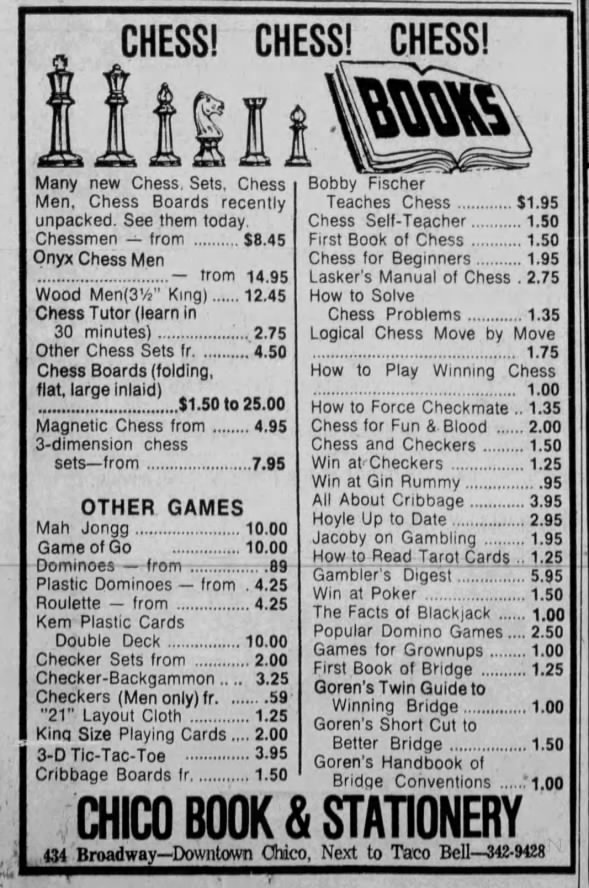 Chess! Chess! Chess! Books 13 Jul 1972, Thu The Chico Enterprise-Record (Chico, California) Newspapers.com
Chess! Chess! Chess! Books 13 Jul 1972, Thu The Chico Enterprise-Record (Chico, California) Newspapers.com
Canarsie Courier Brooklyn, New York Thursday, July 13, 1972 - Page 10
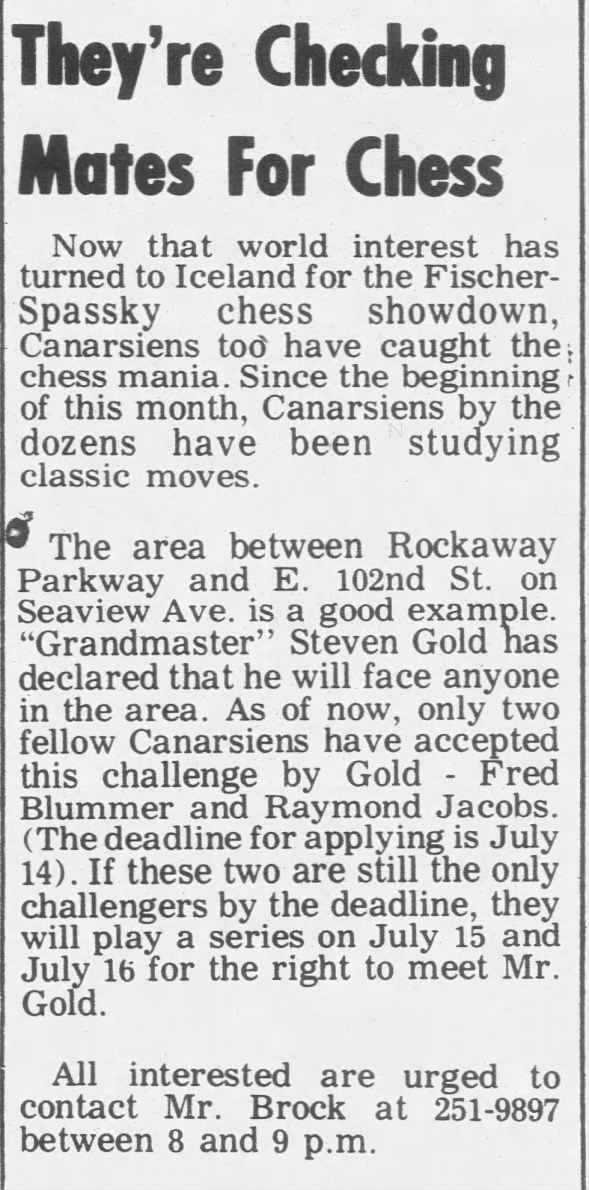 They're Checking Mates For Chess 13 Jul 1972, Thu Canarsie Courier (Brooklyn, New York) Newspapers.com
They're Checking Mates For Chess 13 Jul 1972, Thu Canarsie Courier (Brooklyn, New York) Newspapers.com
They're Checking Mates For Chess
Now that world interest has turned to Iceland for the Fischer-Spassky chess showdown, Canarsiens too have caught the chess mania. Since the beginning of this month, Canarsiens by the dozens have been studying classic moves.
The area between Rockaway Parkway and E. 102nd St. on Seaview Ave. is a good example “Grandmaster” Steven Gold has declared that he will face anyone in the area. As of now, only two fellow Canarsiens have accepted this challenge by Gold-Fred Blummer and Raymond Jacobs. (The deadline for applying is July 14.) If these two are still the only challengers by the deadline, they will play a series on July 15 and July 16 for the right to meet Mr. Gold.
The Kansas City Star Kansas City, Missouri Thursday, July 13, 1972 - Page 1
Russians Happy
Moscow (AP)—The Soviet press today cautiously savored Boris Spassky's victory yesterday and awarded him a psychological edge.
Tass said “observers” in Iceland had noted that “Fischer brought off victories in all the preceding opening games in the tournaments of contenders. And now he has lost.”
But the official news agency quickly added, “the main struggle is ahead, although the world champion must be congratulated on his well-deserved success.”
The Jackson Sun Jackson, Tennessee Thursday, July 13, 1972 - Page 1
Fischer Forfeits Second Game To Spassky
Reykjavik, Iceland (AP) — Bobby Fischer forfeited his chess game with world champion Boris Spassky of Russia today by failing to appear at the playing hall.
Fischer boycotted the game because he objected to the presence of movie cameras ([more specifically the noisy and visible camera-men crews, knowingly making a distraction to disrupt Fischer's focus and concentration, resulting in matches being thrown in favor of the Soviet]) in the hall.
The forfeit gave Spassky, who beat Fischer on Wednesday, a 2-0 lead in the scheduled 24-game series. It was uncertain whether the match would survive.
A call was made to the organizers at 10 minutes before the scheduled start of Fischer's second game with Boris Spassky of Russia. It said Fischer wasn't coming.
Lothar Schmid, the chief referee, said Spassky would have to sit at the chess table by himself for one hour. Then the game could be forfeited by Fischer.
At what point Fischer would be disqualified from the championship series would have to be decided by the International Chess Federation—FIDE, Schmid said.
Fischer was scheduled to meet the world champion from the Soviet Union later today — at 1 p.m. EDT — for the second game of their 24-game match. The American challenger lost the first game Wednesday night.
Fischer staged a 30-minute walkout shortly after the play began Wednesday, complaining that a movie camera 150 feet away was making him ([distracted by the man operating it, according to Harold Schonberg of the New York Times]) The camera was hardly visible ([but the man operating it certainly was, or Fischer wouldn't have raised objections]) outside the lighted players' circle, and it could not be heard by Fischer ([but the disruptive camera crew could be seen, and even heard]), but aides said the knowledge of ([the camera man and crew operating the camera]) its presence unnerved him. ([and why shouldn't such calculated disruptions?])
Chief referee Lothar Schmid of West Germany, who makes the decision on all contested points in connection with the match, told Fischer during his walkout there was nothing he could do about the camera. Film and television rights for the match have been sold to an American promoter, and Fischer and Spassky are to get a share of the proceeds, estimated at a minimum of $27,500 each.
“It's up to Lothar Schmid whether Bobby plays,” one of Fischer's advisers said today.
Contacted at his hotel, Schmid said: “There will be a match tonight. If Fischer doesn't appear, he will take the consequences.”
A member of Fischer's camp said the “legal aspects are being studied.”
Richard Stein, a lawyer for the promoter who bought the TV and film rights, Chester Fox, said he was up all night with Fischer's second, the Rev. William Lombardy, and Fred Cramer of the U.S. Chess Federation.
Stein said that at one point Fischer walked in on the meeting, listened for a few minutes and then in a few sentences indicated he was adamant about expelling the cameras ([due to the disruptive camera crews accompanying the cameras]). Then he went to bed.
In agreement with Lombardy and Cramer, Stein wrote Fischer a letter at 5 o'clock this morning appealing to the challenger to accept the presence of the cameras and go on playing.
“I hope the letter will move him.” Stein said.
Schmid said he was prepared to invoke two rules of the match against Fischer.
Rule 17 prohibits in the name of “the highest principles of sportsmanship” that either player “distract or annoy his opponent.” ([Does that include the Soviet Government and Soviet Chess Federation pulling every conceivable string to manipulate and agitate Fischer's Autism Spectrum, pushing buttons, to calculate forfeited matches due to “distracting and annoying” Fischer, deliberately?])
Rule 21 allows the taking of pictures during the match by official photographers as long as the cameras are “neither visible nor audible” ([but again, not a word is mentioned of the human crews, operating said cameras!])
The camera Fischer objected to was officially sanctioned. ([Great then. Leave the camera there, and tell the operator who is distracting Fischer with their noise and visible commotion they're “no longer needed. The camera can operate itself from here, onward.”])
With a maximum of 23 more games to be played, Robert Byrne, the second-ranking U.S. grandmaster, said Fischer's loss “isn't necessarily all that significant. Either of these players can come back and win.”
A victory yields one point, a draw a half a point, and after Wednesday's match Spassky needed 11 more points in the 24-game series to retain his title.
Fischer needs 12½ points to end the 24-year Soviet monopoly of the title. Today he plays the white pieces, which gives him the first move and a slight advantage.
The first game in the match began Tuesday, and Spassky adjourned it after 40 moves with Fischer in bad straits. Five minutes after the game resumed late Wednesday afternoon, Fischer stood up, spoke animatedly to chief referee Lothar Schmid of West Germany and strode to a backstage dressing room.
Schmid followed him, and Fischer said he wouldn't continue to play unless a movie camera 150 feet from the board was shut off. Schmid said he couldn't order the camera removed. Fischer stayed away for 30 minutes, then came back and resumed play.
After Spassky's 56th move Fischer resigned. He reached over and stopped the clock after 63 minutes had elapsed, offered Spassky his hand, folded his scorecard and walked out. He paused once to wave to the audience, which was applauding Spassky.
When the play resumed Wednesday, Spassky had his king, a bishop that controlled the black diagonals and three pawns. Fischer was down to his king and five pawns, two of them loose on the king's side. One of Spassky's pawns threatened a Fischer pawn.
In his first move, Spassky captured that pawn. Fischer recaptured with his king and the game turned into an effort by Fischer to push his pawns a square at a time to the last rank under the escort of his king.
After his walkout, he made an ineffectual sidestep with his king. In ensuing play all the pawns on the king's side were lost. Fischer shifted his king in a hopeless struggle to the other side of the board, where two of his pawns and two of Spassky's blocked each other's passage.
Fischer couldn't unblock because Spassky's bishop could protect his position from long range. Finally, after Spassky's 56th move — his king approached the jam on the queen's side — Fischer gave up.
The Sydney Morning Herald Sydney, New South Wales, Australia Thursday, July 13, 1972 - Page 4
Chess: Fischer the Underdog
Reykjavik, Wednesday. — Bobby Fischer, the fiery U.S. challenger for Boris Spassky's world chess title, found himself the underdog when the opening game was adjourned last night.
The Soviet title-holder withstood a final test of nerves—Fischer came to his place at the chessboard seven minutes after Spassky had made his opening move—and went on to exploit a risky capture by the American.
He ended the evening with a chance to win today what is otherwise likely to be a drawn game.
Fischer has no chance of victory.
The turning point came when Fischer thrust across the board with a bishop to capture a pawn. It was a risky venture and he was duly punished by the loss of the bishop.
The game resumes at 3 a.m., Sydney time, Thursday. The second game in the series of 24 is scheduled for the following day.
At the start of play last night, Fischer staged a last-minute protest against the facilities.
As the grey-suited Spassky pushed his pawn to queen four at the appointed time punched his clock and walked off the stage, Fischer and his advisers were arguing with the organisers.
Irate Icelandic officials said afterwards that Fischer had demanded that the front 10 rows of audience seating be removed. They said that when the organizers refused he shouted: “I'm not going to be dictated to by little Icelanders.”
He strode in to play just as the near-capacity audience of 2,500 was sensing a new postponement.
The following are the moves of the game, with notes for the “Herald” by Terrey Shaw, the New South Wales champion, and John Purdy, former Australian titleholder.
1. d4(a) Spassky is equally at home in king's pawn and queen's pawn openings, but Fischer is generally agreed to feel more comfortable defending king's pawn games.
1. … Nf6
2. c4 e6(b) Already a surprise! Fischer in the past has continued from here with the aggressive Grunfeld defence, but apparently intends to avoid Spassky's prepared lines.
3. Nf3 d5
4. Nc3 Bb4
5. e3 O-O
6. Bd3 c5(c) Now the opening is finally settled: the famous Nimzowich defence, one of the most complicated lines Black can choose. Fischer at this stage is playing to win.
7. O-O Nc6
8. a3 Ba5
9. Ne2 dxc4
10. Bxc4 Bb6
11. dxc5 Qxd1(d) Disappointing for the spectators. The early exchange of queens robs the game of attacking possibilities. Fischer probably considered that Spassky had maintained the normal edge of the first move and that exchange of queens would remove the pressure.
12. Rxd1 Bxc5
13. b4 Be7
14. Bb2(e) Spassky has won the race to get his rooks “looking at each other.”
14. … Bd7
15. Rac1!(f) Not 15. BxN, as Black, by recapturing, attacks White's rook, thus foiling White's attempt to win the bishop.
15. … Rfd8
16. Ned4 Nxd4
17. Nxd4 Ba4
18. Bb3 Bxb3
19. Nxb3 Rxd1+
20. Rxd1 Rc8
21. Kf1 Kf8(g) Both players bring their kings to the centre now that it is safe.
22. Ke2 Ne4
23. Rc1 Rxc1
24. Bxc1 f6
25. Na5 Nd6
26. Kd3 Bd8
27. Nc4 Bc7(h) From later events it is plain that the obvious 27. … K-K2 was preferable to develop the king. A draw would have been almost certain.
28. Nxd6 Bxd6
29. b5 (see diagram) Bxh2(i) Now Fischer overreaches himself. He tries to manufacture victory from nothing.
30. g3 h5
31. Ke2 h4
32. Kf3 Ke7
33. Kg2 hxg3
34. fxg3(j) The bishop is lost, and now Spassky shows his fine end-game technique. It is interesting to speculate on how Fischer could have deliberately played into this position.
34. …Bxg3
35. Kxg3 Kd6
36. a4 Kd5
37. Ba3 Ke4
38. Bc5 a6
39. b6!(k) White must avoid exchanging pawns to retain the win. A bishop, of course, cannot force mate on its own.
It seems an almost certain win for Spassky. He will exchange his king's pawn, then set up a blockade of the Black pawns, finally sacrificing his bishop for one of them and taking the other with his king. He will then race his king to the other side and queen his knight's pawn. For instance: 41. PxP KxP; 42. P-R5 P-K4; 43. K-R3 K-B6; 44. K-R2 P-K5; 45. K-N1 K-K7; 46. K-N2 P-K6; 47. B-N4 K-Q8; 48. K-B3 P-K7; 49. K-B2 P-N4; 50. B-K1 P-N5; 51. B-N4 P-N6; 52. KxNP P-K8(Q)ch; 53. BxQ KxB; 54. K-B4 K-Q7; 55. K-K5 K-B6; 56. K-Q6 K-N5; 57. K-B7 KxP; 58. KxP and White queens first.
39. … f5
40. Kh4 f4 (Adjourned)
Public Opinion Chambersburg, Pennsylvania Thursday, July 13, 1972 - Page 28
Championship Match Cartoon
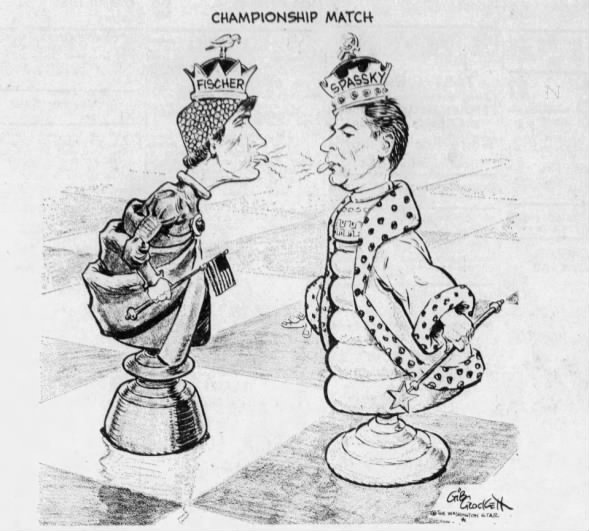 Championship Match Cartoon 13 Jul 1972, Thu Public Opinion (Chambersburg, Pennsylvania) Newspapers.com
Championship Match Cartoon 13 Jul 1972, Thu Public Opinion (Chambersburg, Pennsylvania) Newspapers.com
The Dispatch Moline, Illinois Thursday, July 13, 1972 - Page 2
Fischer Refuses To Play Chess Before TV Cameras
Reykjavik, Iceland (UPI)—Bobby Fischer's representatives met with officials of the TV company broadcasting the $250,000 world chess championships today to try to prevent the challenger from walking out.
Fischer, who held up the first game for 35 minutes Wednesday because he objected to its being filmed on closed circuit television, said he would not show up for today's game with the world champion Boris Spassky of Russian unless all the TV cameras were removed from the hall.
One U.S. chess source said Fischer was unlikely to change his mind. “You can talk to Fischer when he is winning but not when he has lost,” the source said. ([And, because the cause of said “loss” was due to his grievances with the camera crews who seem to go out of their way to be both visually and audibly disruptive
Lothar Schmid, the official referee in the match, said Fischer would forfeit the second game if he did not show up within one hour of the scheduled starting time of 5 p.m. (1 p.m. EDT). Fischer lost the first game to Spassky, putting him one point behind the Russian. A forfeit today would put him two points behind. ([Manipulative maneuvers such as these to win matches, is the only hope the Soviet Union's Chess Federation has to win at this point in Fischer's career.])
The match could go as many as 24 games. Spassky needs only 12 points to keep his world title but Fischer needs 12½ to win.
Schmid also demanded a personal apology from Fischer. The arbiter said Fischer called him a liar when Schmid went backstage Wednesday to try to talk Fischer into returning to the game. Schmid also said the organizers would be allowed to fill the two front rows of the spectator seats in the 3,000 seat hall today. ([Again, knowing this will further distract and disrupt Fischer's ability to concentrate. The Soviet is truly desperate.]) The organizers emptied the two rows Wednesday at Fischer's request but Schmid said this was a one-time concession.
The 29-year-old American walked out Wednesday night because two TV cameras were above the stage and used for the closed circuit TV in the hall.
Fred Cramer, a vice president of the U.S. Chess Federation and acting on behalf of Fischer, said negotiations were underway with Richard C. Stein, a lawyer for Chester Fox Inc., the U.S. company which owns the TV and film rights for the match.
“There is no solution yet, but as long as we talk there is a chance,” Cramer said.
Schmid said the Amsterdam agreement between Spassky and Fischer allows TV coverage of the match and if Fischer refused to play because of the presence of the cameras this would be a breach of the agreement.
Fischer never signed the agreement but he sent a cable through the U.S. chess group accepting it “under protest.”
Officials said they considered the cable legally binding. ([Making up the rules as they go along. Did Fischer agree to the $3.3 million dollar lawsuit, that the Soviet initiated, through Chester Fox, after Fischer succeeded to finally have the distractive cameras shut off, so he could concentrate and finish the tournament? FIDE is suppose to be there to protect players, not entrap them, to harass, hound, persecute and destroy their lives through contracts, like the one that Fischer was forced against his will to “agree” without actually seeing the thing and hence, never signed.])
The Times Shreveport, Louisiana Thursday, July 13, 1972 - Page 4
Bobby Fischer returns to the Laugardalsholl Hall Wednesday to continue unfinished chess game against Boris Spassky. The game was won by Spassky. (AP Wirephoto)
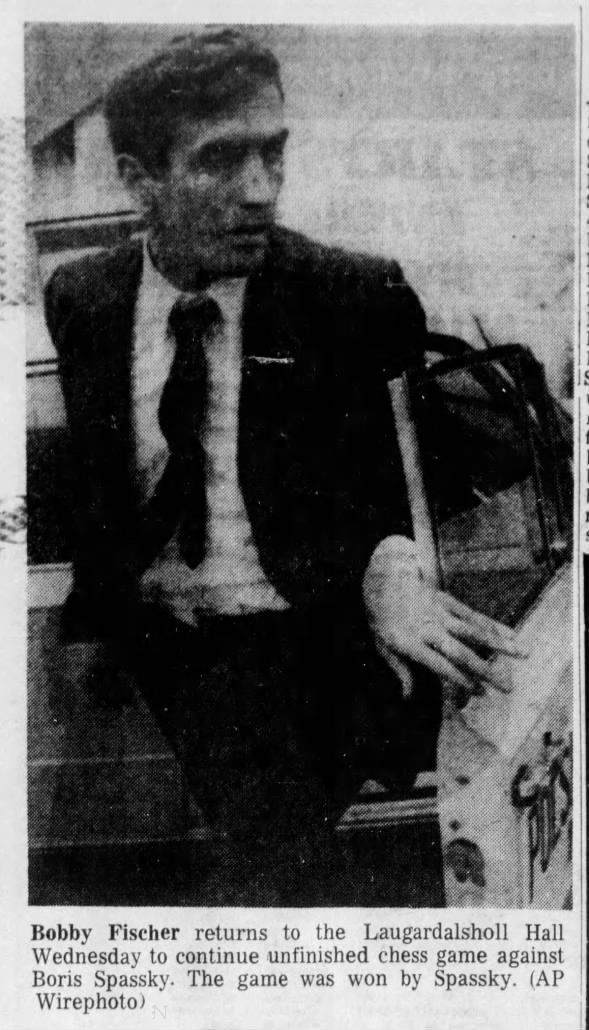 Bobby Fischer Returns to the Laugardalsholl Hall Wednesday 13 Jul 1972, Thu The Times (Shreveport, Louisiana) Newspapers.com
Bobby Fischer Returns to the Laugardalsholl Hall Wednesday 13 Jul 1972, Thu The Times (Shreveport, Louisiana) Newspapers.com
The Chico Enterprise-Record Chico, California Thursday, July 13, 1972 - Page 3
Fischer Forfeits Second Chess Match to Spassky
Reykjavik, Iceland (UPI)—Bobby Fischer forfeited the second game of his world championship chess match with Russian Boris Spassky today.
Fischer failed to show up for the game and an aide said he was asleep.
The forfeit give Spassky a 2-0 lead in the match. He needs only 12 points to retain his title while Fischer needs 12½ to win. The next Scheduled game is Sunday.
Spassky arrived about two minutes before the scheduled starting time and walked slowly around the stage with referee Lothar Schmid, waiting for Fischer. The audience sat silently in the hall watching the empty stage and Fischer's black swivel chair which he had flown in from New York for the match.
Fischer boycotted today's game in protest against the use of closed circuit television to give spectators a better view of the play. Organizers said earlier they would remove one of the cameras if Fischer would play.
The 29-year-old New Yorker walked out for 35 minutes Wednesday to protest two television cameras hidden above the stage where the players sit at the chess board for their championship match, scheduled to run a maximum of 24 games. ([Is the UPI reporter claiming all these cameras operated themselves, when Fischer, and confirmed by Harold C. Schonberg of the New York Times, that Fischer's complaint was against the human operators of the cameras who made a lot of noise, and you could visually see those men, making a nuisance of themselves?])
Although he went into the much-postponed first game a heavy favorite, Fischer made what appeared to be a beginner's error and went down to defeat at the hands of the 35-year-old Soviet world champion.
The moment of truth was painful. Fischer rose from the massive mahogany chess table, made a helpless gesture and resigned at the 56th move. Before walkout out of the hall, he reached over to shake Spassky's hand.
Fischer obviously was upset but Cramer, who is a member of the American's camp, said “he is a pro and this is part of the game. I believe he has got enough to come back in the match. After all, there are 23 possible games left.”
Fischer locked himself into his hotel suite with his second, Father William Lombardy, a Catholic priest who is a grandmaster, to analyze the lost game and prepare for today's encounter.
The challenger lost the first game at the 29th move when in taking one of Spassky's pawns he allowed his bishop to be trapped. By doing this he in effect exchanged one bishop for two pawns—an action which favored the champion.
Although Fischer made a desperate attempt to turn the game into a draw, it became obvious that Spassky could not be kept from promoting a pawn to a queen, thus making an eventual checkmate a certainty.
The Kansas City Times Kansas City, Missouri Thursday, July 13, 1972 - Page 40
Play by Play
Following the first game of the Fischer-Spassky world championship chess match as the moves came over the news wires yesterday were two players who had set up a small chess board outside The Star newsroom. At left is John Tomas, Chicago, who is visiting here and who said he was a 4-time Nebraska state chess champion, and Elliot Winlow, 4012 McGee, Missouri state chess champion.
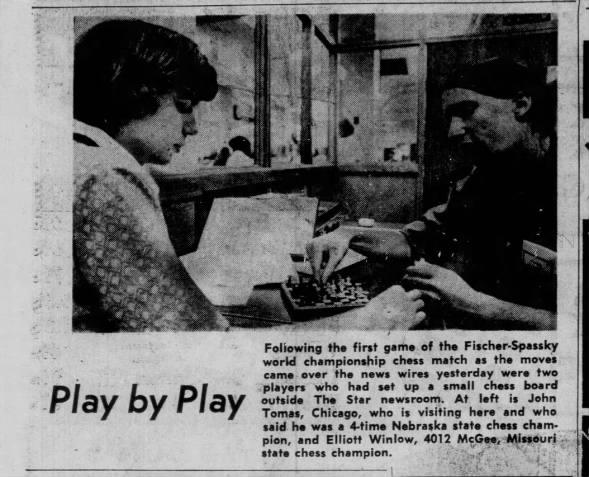 Play by Play 13 Jul 1972, Thu The Kansas City Times (Kansas City, Missouri) Newspapers.com
Play by Play 13 Jul 1972, Thu The Kansas City Times (Kansas City, Missouri) Newspapers.com
The Orlando Sentinel Orlando, Florida Thursday, July 13, 1972 - Page 4
Spassky Team Finds Fischer Flaw by Harry Golombek
Reykjavik — Although when play was adjourned Tuesday night after 40 moves the result seemed unclear and champion Boris Spassky's winning possibilities uncertain, an overnight analysis by his assistant trio of grandmasters—Efjim Geller, Nikolai Krogius and Nej — showed that challenger Bobby Fischer's position was not really tenable in the first game of the world chess championship.
The first few moves of the play off went much as anticipated, but then Fischer's defense became more and more difficult. With a few short sharp strokes Spassky beat back his opponent's king.
THEN CAME a dramatic suspension of play. Fischer observed that a cameraman was training a camera on him from the roof. He protested and said he would not resume play until the camera was removed. For 32 minutes the game stood in abeyance, and in the interim. Fischer's clock was going. However, he had plenty of time. Fred Kramer, vice-president of the American Zone of the World Chess Federation, called in the police and the cameraman was ordered away.
When play was resumed, Fischer's position went downhill rapidly until he reached a point, where he was unable to move without material loss. Desperately he shifted his king over to the other win and did indeed succeed in removing one of the world champion's pawns. Meanwhile, Spassky's king was busily engaged in capturing Fischer's pawns. Fischer resigned on the 56th move when it was apparent that he secure a fresh queen.
SO THE score now stands; Spassky, 1, Fischer, 0, and the favorite has met with an unexpected defeat. Nevertheless, this is what happened to him last year in his final match in the candidates series against Petrosian at Buenos Aires, and he still won that match easily.
Will he recover his nerve in today's game when he has the white pieces: I have the feeling that Fischer is very much like the wounded lion who is never so dangerous as when he is first wounded. We shall see. One thing is certain, the match is very much alive.
[Harry Golombek, international chess grandmaster, has been three time British chess champion and a judge in six previous world chess championship matches. He is chess correspondent for the Times of London.]
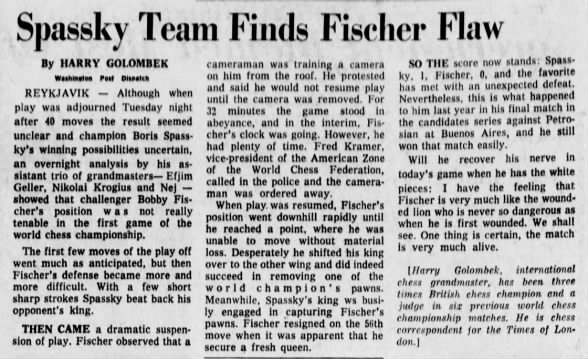 Spassky Team Finds Fischer Flaw 13 Jul 1972, Thu The Orlando Sentinel (Orlando, Florida) Newspapers.com
Spassky Team Finds Fischer Flaw 13 Jul 1972, Thu The Orlando Sentinel (Orlando, Florida) Newspapers.com
Newsday (Nassau Edition) Hempstead, New York Thursday, July 13, 1972 - Page 119
Chess Makes Its Move
Chess players never had it so good. For all those years hardly anybody in the United States knew or cared about the game they play so passionately. Now suddenly it's all over the newspapers and television, very big.
“Bobby Fischer has done a great thing for American chess,” said Howard Osterman, a bearded CCNY student. He was one of a score of buffs who gathered yesterday at the Marshall Chess Club to seen the windup of Fischer's first game against defending world champion Boris Spassky of Russia.
The club is a big, airy, austerely decorated room on the second floor of a red brick building on West 10th Street in Greenwich Village. All around the room members had set up boards matching the positions when play was suspended Tuesday. They tried move after move, trying to figure some way Fischer could salvage a draw.
With the relish of baseball fans second-guessing a suicide squeeze or football freaks debating a fourth-and-one gamble, they argued, as they waited for play to begin, about the move that had put Fischer in trouble. His 29th move Tuesday took a baited pawn, which cost him a bishop.
“I was very surprised,” Osterman said “We all saw Fischer would be trapped.”
Pete Sepulveda, a Columbia student, said “He's such a genius you think perhaps you're wrong, that he has something up his sleeve. Still, it was a bad move.”
David Joseph, an accountant, disagreed. “It was no blunder,” he insisted. “It was psychology, to show Spassky that there weren't going to be any easy draws, to play on Spassky's nerves.”
“In five-hour games the brain gets very fatigued,” said Dr. Edward Lasker. “Blunders are made Fischer risked too much.”
The members had expected to see yesterday's play on television but discovered their set had been burglarized during the night. They got the moves by phone from United Press International. Lasker, a small, white-haired 86-year-old international master long retired from competition, worked them out with magnetic pieces on a big wallboard and analyzed the developments.
After the first few moves came the frantic report, “Fischer leaped from his chair in a fury and walked off, leaving the clock running!”
When play resumed, Lasker kept moving his magnetic pieces and pointing out why things were getting blacker for Fischer. “He can't save himself,” Lasker predicted. “If he plays the pawn to rook four, then in five moves…Even if he plays the bishop to follow with the king, in six moves…” He recalled a game in 1912 in which he defeated the British champion. “I announced a checkmate in eight moves. That game you can find in every chess book.”
Some of the spectators still hoped for a draw. “I think he can draw because he's Fischer,” one said. “He would have resigned if it's as hopeless as everyone says.”
But Lasker kept pointing to an innocent-looking white pawn on the left border of the board, fourth line. “If that were moved up one square, Fischer could run into the corner and get a draw,” he said. “But the white king always defends the pawn if the bishop attacks it…” The spectators nodded soberly.
Finally a man came back from the phone to announce that Fischer had given up.
There will be many who believe he deserved to lose the first game, that he should have forfeited it for not being in Iceland when the match was scheduled to start. But the members of the Marshall Chess Club don't agree.
“Some of the things Fischer has done…” ([are the direct result of Soviet manipulation and reflect poorly ONLY on the Soviet Union and their lackeys in Western media. Soviet ultimatums, refusal to negotiate prematch terms and when Australia and Mexico made legal $175K-$225K bids, those were snubbed by Soviet Russia, threatening they “would not play” in a childish fit because the USSR had selected the Anti-American, Racist Iceland who restricted blacks entry and news coverage, hoping to demoralize Fischer to gain an unfair advantage]) Sepulveda conceded, “but I'm all for him; he's one of the greatest ever.”
“I don't believe he should have been penalized,” Osterman said. “Many of his gripes are legitimate.”
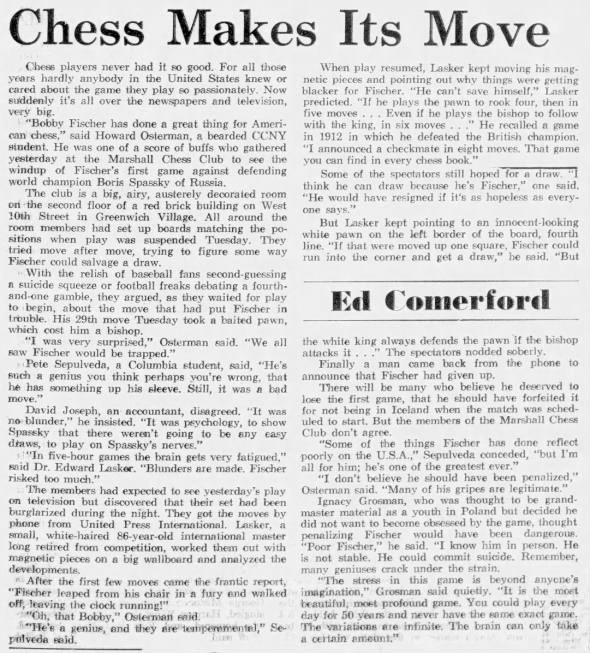 Chess Makes Its Move 13 Jul 1972, Thu Newsday (Nassau Edition) (Hempstead, New York) Newspapers.com
Chess Makes Its Move 13 Jul 1972, Thu Newsday (Nassau Edition) (Hempstead, New York) Newspapers.com
The Age Melbourne, Victoria, Australia Thursday, July 13, 1972 - Page 11
A Bishop Puts The Champion Ahead by Bill MacLean of the Melbourne Chess Club
When Bobby Fischer met Boris Spassky in 1970 he played one of his favorite defenses — the Gruenfeld defence.
But with his second move in this first game he showed he would test Spassky's preparation by adopting the Nimzo-Indian defence and played pawn to king three.
In a natural development by both players in the initial moves Fischer tried to apply pressure in the center but weakened his position when he captured pawn with Queen pawn in move nine.
He realized his slight disadvantage and tried to equalize by a Queen exchange on move 11 which took a major piece off the board.
Over moves 16, 18 and 19 Fischer attempted to equalize by exchanging off pieces but, by move 21, when both players started to bring their Kings in for the end game, Spassky was still better situated.
Spassky on move 23 joined Fischer in the exchange ploy by placing his Rook on the same file as Fischer's Rook which the challenger accepted. But Spassky was still in a better attack position because of his control of more board space.
Fischer suddenly changed his mind on what seemed like only drawish play when in move 29 he captured King Rook pawn although knowing he would eventually lose his Bishop.
At the adjourned position we see that Fischer has begun advancing his three combined pawns forward to penetrate Spassky's sole pawn defence.
However, Spassky still has his bishop!
Alabama Journal Montgomery, Alabama Thursday, July 13, 1972 - Page 18
State Chess Players Keep Close Tabs On Title Match by Hoyt Harwell
The relatively few chess players in Alabama, happy over the surge of interest in the game, are keeping a close watch on the world chess match for various reasons.
And most of them are pulling for American Bobby Fischer in the match in Iceland against Russian Boris Spassky.
Members of the four clubs in Alabama — at Birmingham, Huntsville, Montgomery and Mobile — are doing their best to keep up with each move of the Russian champion and his challenger.
“We all hope to learn something,” John Dohne of Birmingham said today in an interview. He is past president of the club and a director of 15 tournaments.
“Some of us may even have a bet on the match,” he said.
Another club member, Charles Smith, said the match “will be great for national chess. It has created a wonderful springboard of interest and chess has a way of being its own attraction once you can get someone to try.
“Most people shy away from it because of its obvious egghead atmosphere which is not true at all.”
Dohne agreed: “It's already been somewhat of a boon to this country. There has been more in the newspapers about chess the last two months than in the last 10 years altogether. There are a great many youngsters starting to play.”
Alabama has one chess master, Milan Momic of Leighton, a political refugee from Yugoslavia.
“He walked into an Alabama open tournament shortly after he came to this county. He sat down to play and scored 7-0 and was a master at the end of the tournament and has been a master ever since,” Dohne said.
Momic works for an aluminum firm at Muscle Shoals.
“Fischer's temperament ([set off by unethical Soviet manipulation and meddling]) created a little bit of an unfavorable image ([said who, except western media lackeys of Soviet Chess Federation, out to cover up the double-dealing overbearing demands and ultimatums of Soviet/European organizers who refused for months to sort out details before the match. Nor emphasizing in newspapers about Belgrade's illegal demand of $35,000 USD “guarantee” which the USCF rightly refused to fork up! And Mexico and Australia's legal bid of $225,000, snubbed by Russia, in a childish tantrum, threatened they “would not play” unless they got their own way, in almost everything then the USSR selected the hostile Anti-American, Racist Iceland who restricted entry of blacks and news coverage, to prevent Americans and the free world reading about the humiliating defeat of Soviet Russia whose schemes to disqualify Fischer and replace with Petrosian, etc. were known to inner-chess circles. The papers for some reason felt it wasn't necessary to pursue those leads on the misconduct of Soviet and European chess organizers. Strange how they pick and choose their criticism. One-sided and biased.]) Dohne said. “Non-chess players are annoyed and some tell me they hope the Russian wins, but most chess players know about Fischer and hope he wins.
Smith put it this way: “We are pulling for Fischer, certainly. We overlook his idiosyncrasies ([perhaps the fact that Fischer keeps the seventh day Sabbath, which is an affront to antisemites, and likewise resulted in Sam Reshevsky being dubbed “The Reshevsky Problem” when he refused to break and play on the Sabbath day, or Fischer dubbed “temperamental” because he chose to walk out of a tournament while he was in the lead, rather than break the Sabbath day. Both men kept the 7th day Jewish Sabbath, and therefore a target of the Soviets' antisemitic abusive smears in press.]) We overlook his idiosyncrasies because he's demonstrated this ever since he's been a child prodigy.” ([Could Fischer so easily overlook the vicious Soviet smear campaign coordinated by Soviet sympathizers who regularly made up false stories, seeking to defame Fischer as “strange” which later devolved into charges of madness? If Bobby was a loner, explain why he would enjoy socializing with people who couldn't say anything but biting, derogatory slurs?])
Smith said that most chess news usually is obtained through special publications and is two months old. He said it was an unusual pleasure to be able to keep up with the Spassky-Fischer match on a day-to-day basis.
In fact, the Birmingham club at its Wednesday night meeting spent most of the time studying the moves by the two masters.
The Birmingham club has about 50 members, most of them new, young members. “In fact, one other man and I were the only ones at our last meeting with shoes on,” Dohne said. ([and if Fischer had arrived “without shoes on,” he'd been made the brunt of ridicule, widely publicized in the press as “unkempt,” “imbalanced,” “too poor” to afford a pair of shoes and his entire family put on trial in the court of public opinion for doing exactly what EVERY ONE else was doing! They scrutinized Fischer, put everything he said (and things he didn't say) under the microscope, they mocked his mannerisms, persecuted and berated him for mannerisms of those born on the Autism Spectrum. Just par for the course growing up during the intolerant 1960s-1970s era America.])
“The interest by youngsters is a good thing. They have bright, quick minds. When you get 50 you just play for fun; you can't be a great competitor.”
The average game in the club lasts from 30 to 45 minutes, Smith said, “mainly because when a lost position is reached, the player will usually not continue. Being amateurs, we have a way of reaching lost petitions must faster than masters would.”
He said of Fischer: “The beauty of the games he plays by far overcome any dislike of him in his person actions.” ([What actions? That Fischer rightfully retaliated against Soviet muddling and manipulation of the tournament via assistance of the biased Icelandic organizers? See above. Is this guy even aware of the decades of hostile Anti-American atmosphere, related to the Keflavik NATO military base, and bitter Anti-American sentiments that were held against American challenger Fischer, years before the 1972 match was even conceived? Why do the papers avoid the issue, that the Soviet “selected” Iceland, knowing they were forcing Robert Fischer into a political hornet's nest. The speaker only knows the very limited reports printed in his local newspaper, written by Soviet associates in the press, with very few facts allowed to filter through to the “daily edition” from thousands of miles away.])
The Alabama Chess Championships will be held during the Labor Day weekend in Montgomery with from 50 to 60 players expected, and a stronger interest than ever, due to the current Fischer-Spassky match.
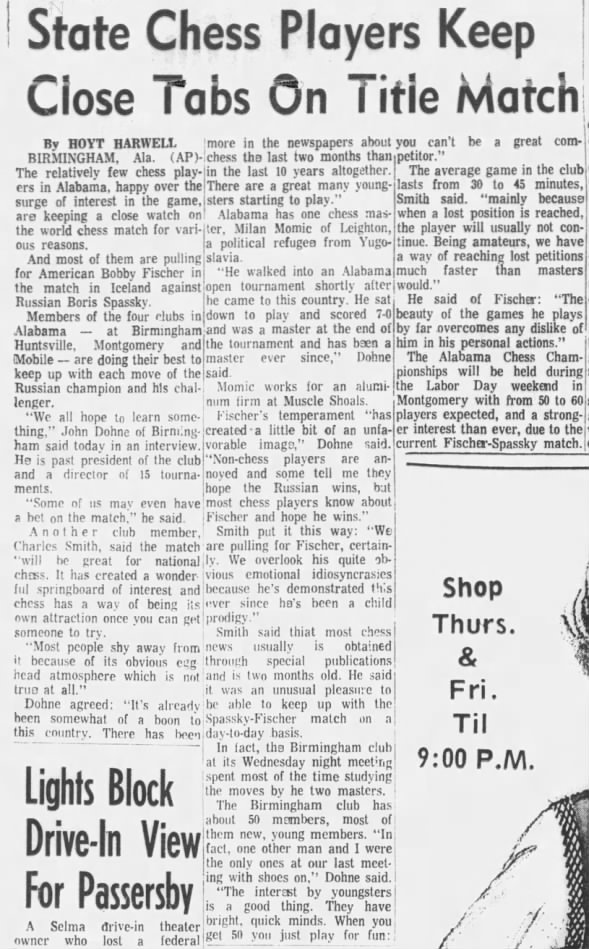 State Chess Players Keep Close Tabs On Title Match 13 Jul 1972, Thu Alabama Journal (Montgomery, Alabama) Newspapers.com
State Chess Players Keep Close Tabs On Title Match 13 Jul 1972, Thu Alabama Journal (Montgomery, Alabama) Newspapers.com
The Los Angeles Times Los Angeles, California Thursday, July 13, 1972 - Page 17
Fischer Defense Fails in Face of Bishop. Pawn Held Down. by Isaac Kashdan
World chess champion Boris Spassky won as expected Wednesday in the adjourned session of his first chess game with challenger Bobby Fischer of the United States.
Fischer continued the game for an additional 15 moves, then resigned. There was no longer any hope for a draw.
Spassky's task was not particularly difficult. He had gained a bishop late in Tuesday's session due to a serious error by Fischer.
Fischer had two pawns as compensation for the bishop, but they were separated and weak. The pawns soon fell due to good strategy by Spassky.
There were then two defensive methods open to Fischer. The one he chose was to attack Spassky's rook pawn. Spassky had no objection, and he moved toward Fischer's queen-side pawns as the quickest way to win.
Spassky planned to free his one remaining pawn and in a few moves advance it to queen. Whenever Fischer's pawn became dangerous, the long-ranging bishop would be there to hold it.
The alternative course was for Fischer to retreat his king to defend his remaining pawns. Curiously enough, this would have led to a draw if Spassky's pawn had been on R5 instead of R4.
This is an unusual, little-known situation in which white cannot force a win, despite that fact that he has the bishop.
Following is a position that might have occurred in the game.
If you advance the white pawn to R5, all the pawns on the queen side are blocked and immobile. Fischer's king can never be driven from the area. Stalemate is a constant threat.
Fortunately for Spassky, the one square between the pawns can be utilized. In the position shown Spassky would play K-K7, deliberately stalemating the black king.
Fischer's only reply would be P-R4. Spassky would proceed by attacking the pawn with the bishop, at the same time releasing the stalemate.
Capturing the pawn on the following move, Spassky would free his own rook pawn, which would lead to a routine win.
The Charleston Daily Mail Charleston, West Virginia Thursday, July 13, 1972 - Page 4
Chess Is War; All Is Fair by Jack Seamonds
“Atta babe, Bobby, put one over the ‘ole left field wall.”
A raucous, lung-stretching roar, aimed, you imagine, at some limber, gum-popping, bat-swinging Casey as he strolls to the home plate. Like, 9 to 9 in the top of the ninth, or something like that.
Actually, the “Bobby” we refer to is none other than Bobby Fischer, U.S. grand master of the chess board who has the dubious accolade of having infuriated Russia, Iceland, the prestigious Federation Internationale des Echecs (sort of a Supreme Court of chess) and various sundry commentators.
I can not help feel that, had the public paid attention to the game before, Fischer's actions in Reykjavik would have been predictable if not understood.
The key to it all, I believe, is a statement Fischer made some time ago to reporters after winning an American tournament. “I like” he remarked, “to see them squirm.”
And other grand masters have agreed, at least in principle, with this intellectually bloodthirsty sentiment. “The most beautiful moment of all,” another grand master, a Russian-American, once told a close friend, “is when I make my final move, look into my opponent's eyes, and watch the suffering. He simply has no where to go.”
You see, I think much of the “flak” Fischer has received originates from a misunderstanding of both the game and the men who play it best, the grand masters.
Fischer has been called various venomous and villainous names because he held out for more money, showed up late a few times, refused at first to play in Iceland and was more or less “rude” to his Russian opponent, a fine player named Boris Spassky, who has stoically endured the chaos.
But, just a minute. Lets take the same attributes, transfer them to another sport, one more commonly known as the “great American pastime,” baseball, and take a look at the results.
Like 'ol Dizzy Dean, a match for anyone when it came to intimidating the opposition back a few years.
And fiery baseball infielder Pepper Martin must have burned the midnight oil racking his mind for new angles on heckling the enemy teams. Many a bewildered foe must have looked back on verbal— and often, physical—clashes with the Pepper and wondered how it came about.
And, more recently, a loose-lipped boxer titled Muhammad Ali, who lost, as I recall, to a dedicated dynamo named Joe Frazier. What about a flashy, loud mouthed quarterback—Joe Namath—who wrote a lousy book, ran a lousy club and punched out a news photographer.
Remember, when Muhammad Ali was better known as Cassius Clay, and the biggest “stinger” he had was language? Remember the title of Namath's dabbling in the world of letters?
So, sports fans, if 'ole Bobby chooses to “psyche” his opponent by appearing late, and gets away with it, can you condemn him? The promoters are calling this the “match of the century,” and I think we've all heard this cliche before. Percentage of the gate is a big factor in “matches of the centuries.”
Encyclopedia Britannica says chess is war. “Two chess players fighting over the board may fitly be compared to two famous generals encountering each other on the battlefield.”
And the psychology of warfare is often unpleasant, but pragmatically, it is also often successful.
So, as we enter the first few weeks of the “match of the century” remember that chess is war, and all is fair therein.
Oh, and by the way, Checkmate.
 Chess Is War; All Is Fair 13 Jul 1972, Thu The Charleston Daily Mail (Charleston, West Virginia) Newspapers.com
Chess Is War; All Is Fair 13 Jul 1972, Thu The Charleston Daily Mail (Charleston, West Virginia) Newspapers.com
Daily News New York, New York Thursday, July 13, 1972 - Page 53
Opener Goes To Spassky in 56 Big Moves by Robert Byrne
Reykjavik, Iceland, July 12—Boris Spassky, 35, world chess champion, won the opening game of his 24-game title match with challenger Bobby Fischer in 56 moves here in the Laugardalshoell Sports Palace tonight.
The blond Russian got off to a slow start in the first session yesterday, aiming for a solid position by the careful 9. N-K2. Up to move 29, that strategy had completely failed to pay off against Fischer's exact defense, and it looked as though the first game of the match would end in a peaceful draw.
But Fischer shocked the fans here by snapping off the king's rook pawn, allowing Spassky to trap his bishop. Six more moves left Bobby minus the bishop, with only two pawns to show for it. No one knows for sure whether it was audacity or a miscalculation of this possibility: 33. P-R6, 34. K-N4 B-N8, 35. KxP BxP, 36. B-Q2 that did Bobby in.
Determinedly struggling to make use of his superior king position and the two pawns, the American had succeeded by move 40, when the first session ended in confusing about half the followers into thinking he was on top. But he couldn't fool Spassky. When play resumed tonight, the world champion drove smoothly to the win by precise, merciless technique.
The World Coos Bay, Oregon Thursday, July 13, 1972 - Page 5
Fischer Doesn't Show Up
Reykjavik, Iceland (UPI) — American chess champion Bobby Fischer failed to show up at the scheduled starting time today for his second game in the $250,000 world championship match but he had one hour to beat the clock.
His aides said he was still asleep.
If he does not show up by 6 p.m. (2 p.m. EDT) he forfeits the game to world champion Boris Spassky of the Soviet Union.
Organizers of the match earlier said they would remove one of the television cameras ([which includes the disruptive camera men that Fischer had directed his actual complaints]) from the hall if Fischer would play Spassky.
Fischer held up the first game for 35 minutes Wednesday because he objected to its being filmed on closed circuit television. He said he would not show up for today's game with world champion Boris Spassky of the Soviet Union unless all the cameras ([yes, which translated into plain English as: “…they had these characters there, who instead of having, some kind of video tape film that didn't make any noise, just, nobody around to operate them, just sort of stationless and they just had guys there with film cameras that were worrying, and they were all around me. Making a racket. A nuisance. Too much noise, and visually you could see them moving around.” - Fischer to Johnny Carson, U.S. Nightly Talk Show host, November 1972. Therefore no doubt remains, it was NEVER CAMERAS, but, rather the disruptive camera men operating the devices, but news journalists are seeking to mislead their readers. The only question remaining is to ask, “Why?”]) were removed.
Referee Lothar Schmid said Fischer had one hour past the scheduled starting time of 5 p.m. (1 p.m. EDT) to show up or he would forfeit the game to Spassky. He has already lost the first game and a forfeit would put him two full points behind the Russian. Spassky needs only 12 points to retain his title but Fischer needs 12½ points to win.
It was not immediately clear which camera the organizers agreed to remove. There are four camera positions in the hall…two above the stage and two on the floor. The organizers also said they would relocate two of the cameras which Fischer said disturbed him.
“We don't know for sure Fischer will accept this arrangement,” said Harry Golombek, a member of the International Chess Federation (FIDE).
Fred Cramer, a vice president of the U.S. Chess Federation and acting on behalf of Fischer, said negotiations were underway with Richard C. Stein, a lawyer for Chester Fox Inc., the U.S. company ([which is clearly working in collusion with Soviet Chess Federation officials, to disrupt Fischer's games, then misled readers of U.S. newspapers back home, that Fischer was merely “imagining his grievances with ‘un-manned cameras’” which is patently false, and NOT the situation]) which owns the TV and film rights for the match.
“There is no solution yet, but as long as we talk there is a chance,” Cramer said.
Reykjavik, Iceland (UPI) — Bobby Fischer forfeited the second game of his world championship chess match with Russian Boris Spassky today.
Fischer failed to show up for the game and an aide said he was asleep. ([Good for him! All that Soviet-drama queening can really take its toll on the nervous system and tucker out a chess player worth his salt, the likes of Robert J. Fischer.])
The Journal Times Racine, Wisconsin Thursday, July 13, 1972 - Page 1
Boycotts Chess Match
American Bobby Fischer peered through his fingers during his first chess game Wednesday with Russia's Boris Spassky in Iceland. Fischer lost the contest. They were scheduled to play again today, but Fischer informed the organizers of the world chess championship that he is boycotting further play unless three hidden movie cameras ([this report, oddly, makes no mention of the disruptive camera man who was located on the roof, training a camera on Fischer, that was trespassing and ejected by police at the request of the official Fred Cramer. Detailed by international chess master Harry Golombek, see “Spassky Team Finds Fischer Flaw” by Harry Golombek]) are removed from the hall. Lothar Schmid, chief referee, said Spassky would have to sit at the chess table by himself for one hour. Then the game would be forfeited by Fischer. At what point Fischer would be disqualified from the championship series would have to be decided by the International Chess Federation, Schmid said. —AP Wirephoto.
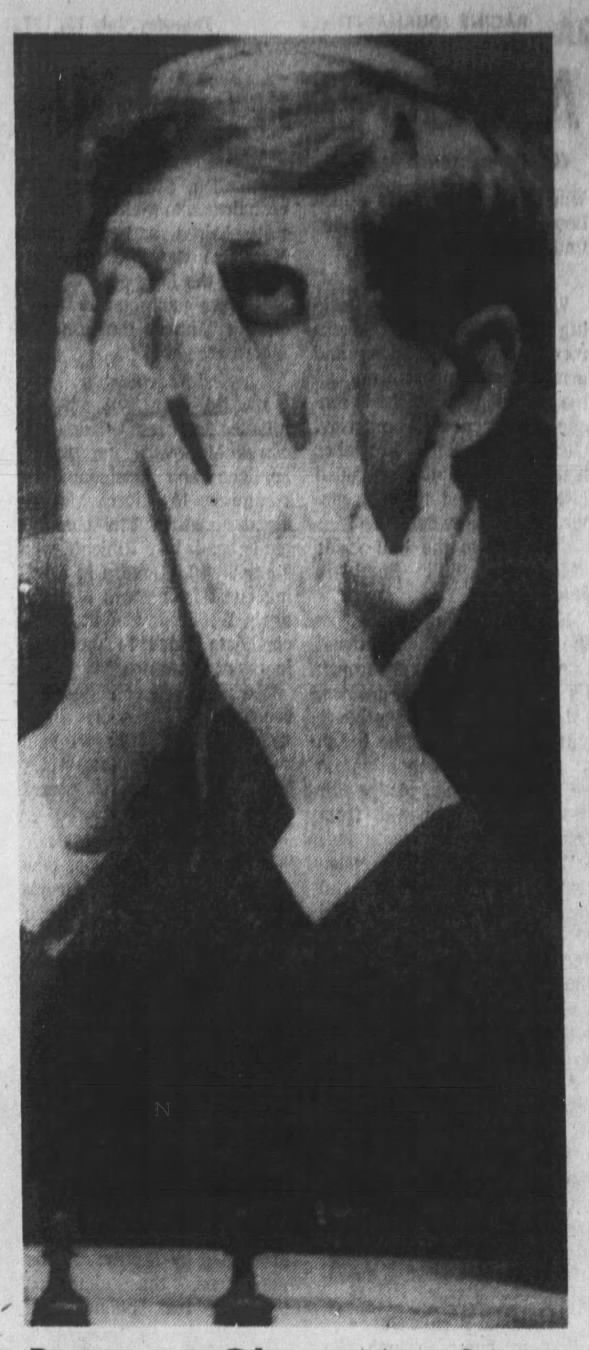 Boycotts Chess Match 13 Jul 1972, Thu The Journal Times (Racine, Wisconsin) Newspapers.com
Boycotts Chess Match 13 Jul 1972, Thu The Journal Times (Racine, Wisconsin) Newspapers.com
The Philadelphia Inquirer Philadelphia, Pennsylvania Thursday, July 13, 1972 - Page 39
The Public Speaks: Is Chess Becoming Popular in the U.S.?
How You Voted. Yes: 75% No: 25%. Sample ‘Yes’ Comments. “It took Bobby Fischer to make it popular” … “We're finally catching up with the rest of the world” … “It's about time” … “Especially if Fischer beats the Russian” … “It's a worthwhile game and should be played by everyone” … “It's one sport that is inexpensive to play” … “I think it has always been popular.”
Sample ‘No’ Comments. “There are not enough organized chess matches to make it popular” … “Not enough people know how to play the game” … “If you indulge in anything more intellectual than draw poker you are considered odd” … “After the Fischer match is over the excitement will die out.”
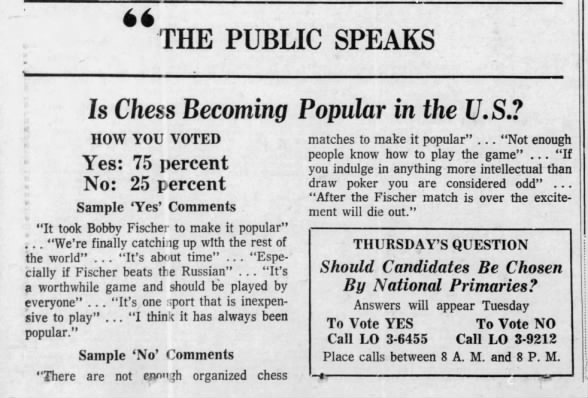 Is Chess Becoming Popular in the U.S.? 13 Jul 1972, Thu The Philadelphia Inquirer (Philadelphia, Pennsylvania) Newspapers.com
Is Chess Becoming Popular in the U.S.? 13 Jul 1972, Thu The Philadelphia Inquirer (Philadelphia, Pennsylvania) Newspapers.com
Clovis News-Journal Clovis, New Mexico Thursday, July 13, 1972 - Page 8
Station Attendant Remembers Long-Ago Chess Competition
Los Lunas, N.M. (UPI)— A Los Lunas gas station attendant teaches a small chess class, used to write a chess column and remembers a pickup chess club in this small central New Mexico community.
But Guilles Levesque vividly remembers a pickup chess match he got into some 20 years ago while stationed at Bolling Field, near Washington, D.C.
“I was just sitting in the Officers' Club when this young fellow, who looked about 8 or 9-years-old, came in and asked me if I played chess,” Levesque said. “I told him I played at it, so we played a game.”
“I played a little bit loosely, figuring that he was just a kid. I thought I would try to make it interesting for him.
“In 10 or 15 minutes, I found myself checkmated.
“I thought, well, I played a little solidly in the second game —didn't take so many gambles,” he said. “In about the same amount of time, he beat me again.
“It was getting embarrassing, so I played the best I know how in the third game. And he had no more trouble than in the first game.
“Several months later,” Levesque said, “I picked up a chess magazine and saw the youngster's picture on the cover. I learned that he had just taken the New York State (chess) championship and learned his name — Bobby Fischer.
Arizona Daily Star Tucson, Arizona Thursday, July 13, 1972 - Page 58
Rehashed Soviet Anti-American Invective to Turn Public Interest and National Support Base Away From Fischer's Defeat of USSR
Fails to elaborate on the finicky, overbearing demands and complaints of European organizers who refused for months to sort out details before match. Belgrade's illegal demand of 35K USD “guarantee” refused by USCF! Australia's legal $225K bid snubbed by Russia, threatening they “would not play”. USSR selecting Anti-American, Racist Iceland who restricted entry of blacks and news coverage ([says Archie Waters: “Then, the camera panned the huge crowd for reactions and, for one heart-stopping moment — my daughter exclaimed — it settled on the only African-American in the auditorium, or anywhere near the auditorium — me. I was applauding. I had been on Fischer's management team for three vacation weeks in an Iceland city, with its one-story, pastel-colored roofs and mostly blond, blue-eyed residents.” —Archie Waters, El Paso Times El Paso, Texas Sunday, August 22, 1993.])([says Fischer, “…they had these characters there, who instead of having, some kind of video tape film that didn't make any noise, just, nobody around to operate them, just sort of stationless and they just had guys there with film cameras that were worrying, and they were all around me. Making a racket. A nuisance. Too much noise, and visually you could see them moving around…I was more disappointed than anybody that this thing wasn't televised because, you know, there was a lot of publicity and a lot of money involved and I wanted the people to see me in action. - Robert J. Fischer on Johnny Carson, November 1972]) Schemes to disqualify Fischer and replace with Petrosian, et cetera, et cetera, et cetera on the Fascist Nixon sending a prize gift of an exquisite chess board to Soviet officials, prior to the match, further reports of meetings between Nixon, Kissinger and Soviet officials relaxing with dinners and entertainment, in private, to sort out “trade deals” and plotting further war on Asia, and alas, to appease the Soviet officials the antisemitic Nixon never sent an official White House dinner invitation to Robert J. Fischer. Much like Jesse Owens, Gold Medal Olympian, was snubbed by the racist U.S. President, Franklin D. Roosevelt, who likewise, was consorting with Stalin, making “trade deals” to purchase Ukrainian grain, while an estimated 7-14 million Ukrainians were starved in Stalin's man-made famine, the “Holodomor,” during his term as president.
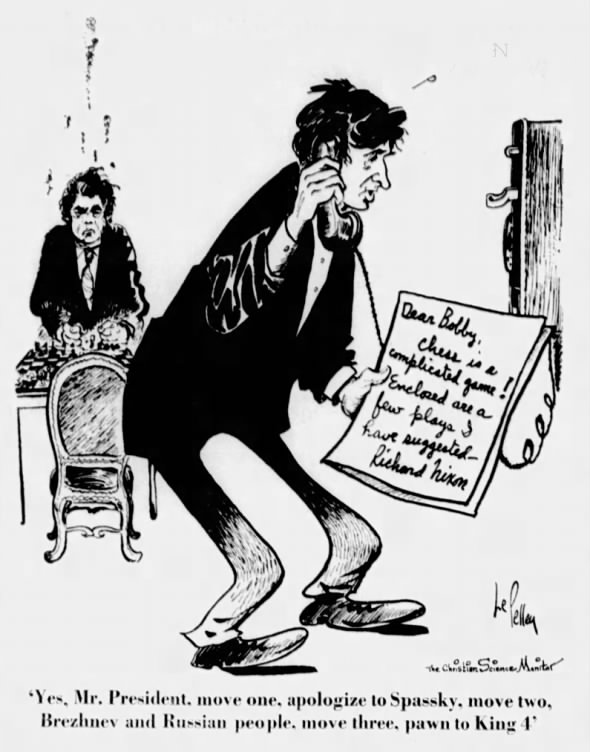 Rehashed Soviet Anti-American Invective to Turn Public Interest Away From Fischer's Defeat of USSR 13 Jul 1972, Thu Arizona Daily Star (Tucson, Arizona) Newspapers.com
Rehashed Soviet Anti-American Invective to Turn Public Interest Away From Fischer's Defeat of USSR 13 Jul 1972, Thu Arizona Daily Star (Tucson, Arizona) Newspapers.com




























